#this is another meta that i had in my drafts for a long time and forgot to post
Text
One of the things I've seen from Dany antis is the argument that, since Daenerys will eventually leave Slaver's Bay behind, instead of staying there forever to keep helping the slaves, that means that she doesn't really care about the slaves, that she is not really a selfless person and that she is not really a hero. And I really don't agree.
First, because we are in Dany's head and we have plenty of evidence in her thoughts that she does care about the slaves.
Second, because staying in Slaver's Bay was already selfless on Dany's part. Staying in Slaver's Bay brought her no benefit whatsoever, if she was a selfish person she would just have taken the Unsullied to Westeros and left all the rest of the freedmen that were of no use to her behind, but she didn't do this. She stayed in Slaver's Bay to protect people who were of no use to her, to protect people who would not become her soldiers, and staying in Slaver's Bay would only squander her army, because the Sons of the Harpy keep murdering them, and because staying in Slaver's Bay means using her resources in Meereen and depleting her army to fight against the slavers.
Third, just because Dany will eventually leave Slaver's Bay to pursue her own personal desires, doesn't mean what she did in Slaver's Bay wasn't selfless. A hero doesn't have to be 100% selfless and abnegate all of their personal desires in order to be a real hero. Dany already did for Slaver's Bay more than any other person would have done, and she had zero obligation to do so. She had zero obligation to free slaves, she had zero obligation to stay to protect the slaves, and yet she did all of that. Dany already did more for the freedmen than she had any obligation to, and she did all of that out of pure selflessness. Just because she will not dedicate her whole life to fighting slavery and to giving herself to others, doesn't mean she wasn't selfless. Just because at some point she will decide to pursue her own personal goals, doesn't mean she becomes a less selfless person, it just means she is a human being who can't be expected to abnegate her entire life and dedicate it to others. Leaving Essos behind doesn't erase Dany's heroism, she already did more for the slaves than anyone else. A character shouldn't have to be perfectly selfless and abnegate everything to be considered a hero.
P.S.: It's really something seeing people say that Daenerys is not a hero because she won't spend her entire life fighting slavery, when other characters doing the bare minimum are considered heroic by the fandom. I've seen metas in the fandom talking about how Sansa is such an amazing hero because she calmed Sweetrobin. So Sansa is a hero for such a small moment of empathy, but Dany is not a hero because she doesn't want to spend the rest of her life fighting slavery, even though she already did plenty and more than any other person would do.
P.S. 2: Also, if Dany antis think she is "evil" just because she won't spend her entire life dedicated to the slaves, then by their own logic, any person who doesn't spend their entire life fighting for a social justice cause is also "evil". So by their own "logic", their faves are "evil" as well, because most of them aren't really dedicating their lives to fight the status quo.
#daenerys targaryen#daenerys defense squad#my meta#this is another meta that i had in my drafts for a long time and forgot to post
163 notes
·
View notes
Text
rei and miri's physicality: a chronological analysis (part 1)
Time to go into one of the meta topics that has been buzzing in my head for a while now. It's about how Miri and Rei interact with respect to physical contact, and how I am smitten by the way he's so gentle with her and lets her take liberties with him. This is gonna be long and image-heavy [NB now has descriptions]. I have to split it into two parts because of the image limit.
Episode 2! This is the first time that Miri and Rei have physical contact with each other, and it's Kazuki pawning her off to Rei so he can make breakfast without her running underfoot.
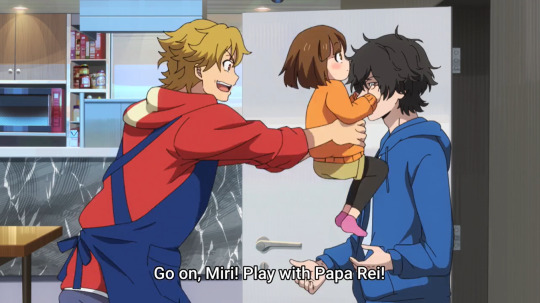
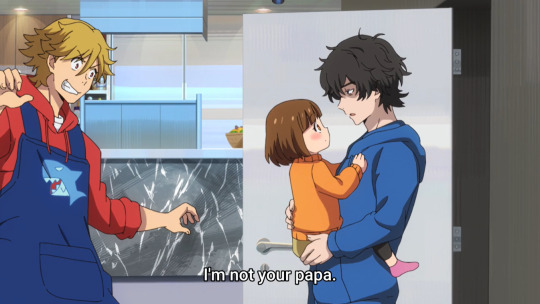
As I went to get these screencaps, I noticed that Rei's hands automatically come up to hold her even though he's clearly kind of sceptical about the arrangement at this point. (Lol at Kazuki backing away as though he's afraid Miri is radioactive).
Episode 3! And here begins a running gag about Miri's favourite way to wake up Rei lmao.
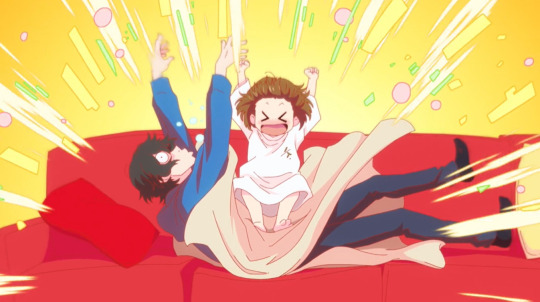
I'm curious as to why Rei was sleeping on the sofa to begin with, when that's where they put Miri until she gets her own room in episode 4, and Miri didn't know Rei slept in the bathroom until later on.


Miri goes looking for Rei after Kazuki turns down her request to sleep with him. She finds Rei sleeping in the bathtub as per usual for him and eagerly clambers into the tub so she can sleep with him. Going by the setup of Misaki's apartment in episode 11, she's probably used to sleeping with her mother.
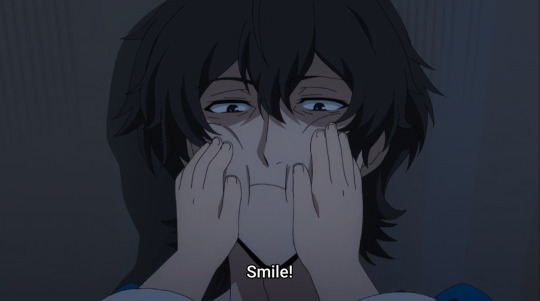
Despite his resting bitch face and reserved demeanour, Miri is already super comfortable with him. She's plopped on his chest, pawing at his face, and goading him to smile. And Rei is very accommodating of her whims. He later tells her to stop kicking the back of his seat in the car, but doesn't tell her to stop pawing at his face. Around this time in the story, Kazuki complained about her climbing into his lap when he was trying to eat, but Rei just....lets this happen lol.
There's a cut out and it fades back into her asleep in the tub, wrapped in Rei's blanket as he looks down at her from outside it. The implication seems to be that she just tired herself out pawing at Rei and then he relinquished his sleeping spot, probably to go out on the sofa.

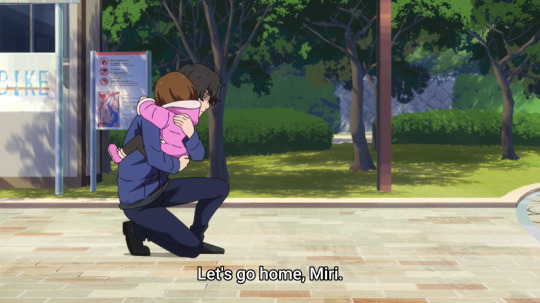

Such a significant moment. I had already realised that this was the first time that Rei had addressed Miri by name, but it was only while I was drafting this post that it hit me that this was also the first time he had willingly and consciously initiated physical contact with her. I also think it's significant that he repeats the 'Let's go home, Miri' line after she's jumped into his arms. It's him fully committing to the sentiment.

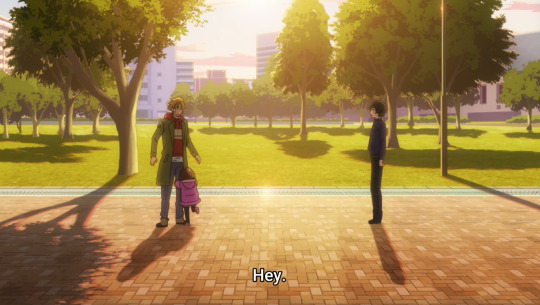
It's sweet how after he has made his 'I'm her papa' resolve, he doesn't seem to put her down again until they meet back up with Kazuki.
Episode 4!

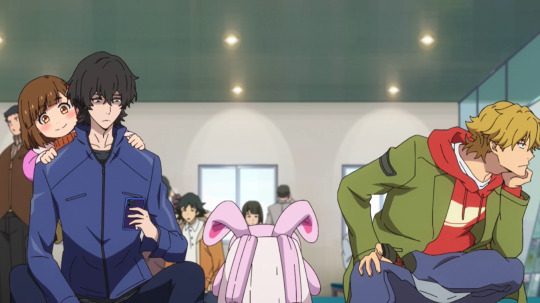
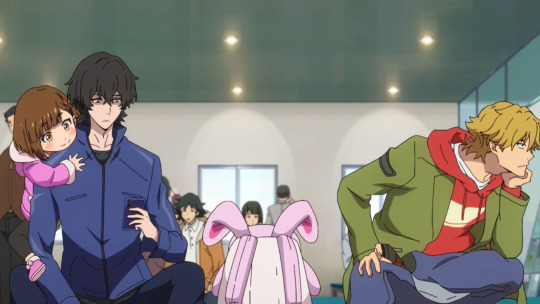
It's so adorable how Miri loves climbing on Rei and how he just let's her despite him not being a tactile person.


Him keeping Miri on his lap after they both woke up from their nap is so precious.
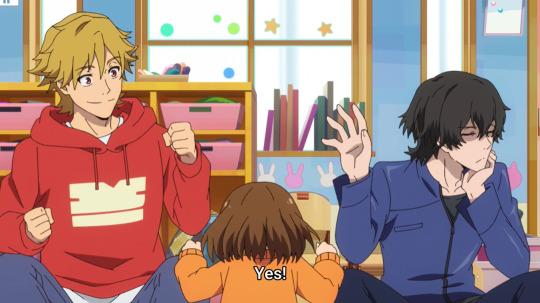
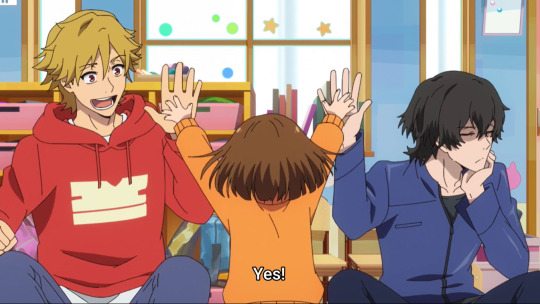
Tsundere Rei lol. Even though he acted very put upon to be there, he was clearly paying attention and even anticipated the high five coming before Kazuki did.

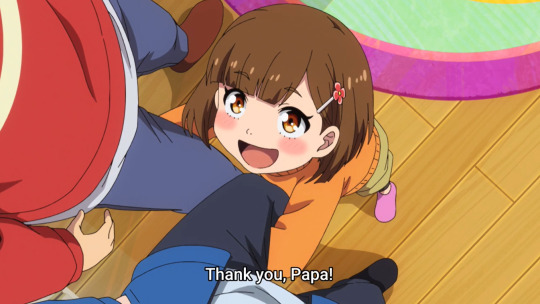
I think this is the only instance of her hugging both their legs at once and I love it. I love it! It's so dear to me. I love this family 😭
Episode 5!
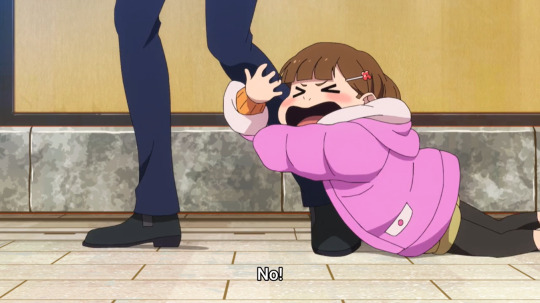

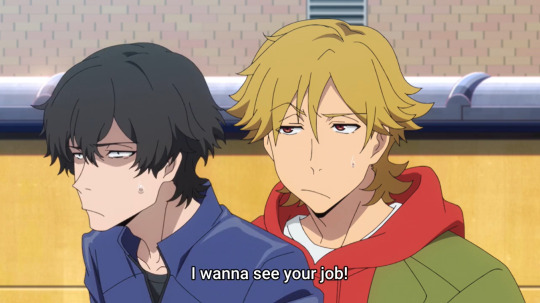
Rei's expression here is golden. Miri, like most small children, is very adorable. But, also like most small children, she can be very annoying lol.


We get another instance of her preferred method of waking up Rei--jumping on him--band she even shakes him for good measure, but he's simply too tired to react.
This is also a good point to note the difference between him sensing something and waking up before she even flipped the lights in episode 3 and the way he's now so comfortable with her presence here that can even sleep through her deliberately trying to wake him.
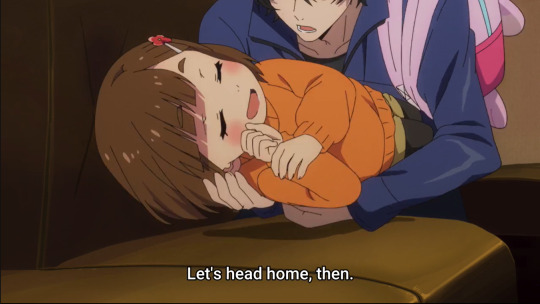
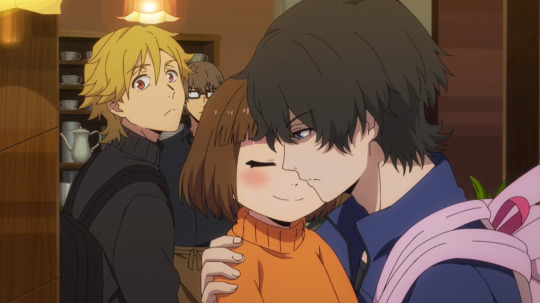
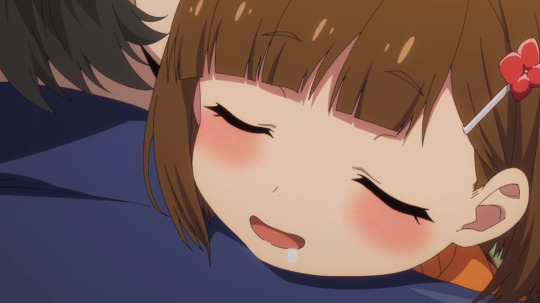
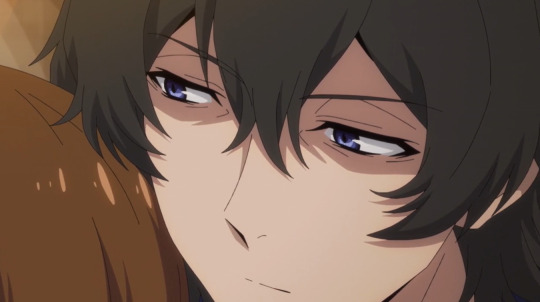
I wish I had a gif because screenshots do not do justice to the softness with which Rei picks up and gazes at Miri while she's asleep. He's 1000% having a 'that's my baby girl; I'm her dad' moment.
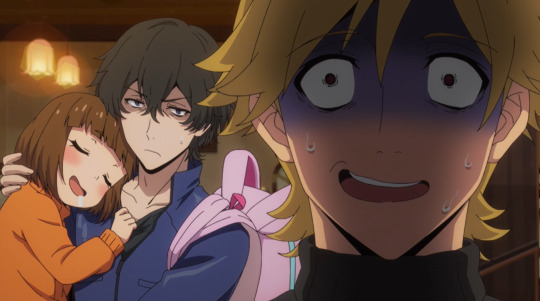
And just look at his expression after Kyu reveals he knows what the deal is. He's nervous about what Kyu will do, and there's also so much 'don't take her away from me' energy coming off him. I see in him shades of the Rei who will tell Kazuki that he wants to keep taking care of her after her mother is killed.
And that's part one! Part two is here.
#buddy daddies#buddy daddies meta#suwa rei#unasaka miri#kurusuwa family#part 2 is about 1/3 of the way drafted#might have it out before the end of the weekend#dancing in my mind is a post about how rei and miri interact on an emotional level#specifically how he explains things to her and also gets help from her#further back is a post about how kazuki develops as a parent with miri#he came in with more practical experience and had the previous anticipation of parenthood but he also had things to learn
198 notes
·
View notes
Note
Hi! I love your writing think it’s phenomenal work. It’s really such a genuine and intimate depiction of Ginny. I also see you have an appreciation of Dean Thomas. I’d love to know why you think Ginny was attracted to him? What do you think their relationship was like and how did it help them for their next partners? I just think that pairing was really interesting and there’s not enough of them being friends.
❗️ Warning... big Dean & Ginny meta incoming ❗️
Firstly - thank you so so much for reading and enjoying my work (phenomenal!!! I’ll dine out on that all week - can't thank you enough).
Secondly - what great questions! This was such a fun thing to think through. Dean’s a quietly lovely character I have so much time for, despite being very underdeveloped in canon (cutting his arc to exclusively favour Neville’s? Side-eye forever). I'm definitely a paid up member of the Dean Thomas Fan Club.
Anyway….. the questions were so good I wrote this too-long meta on Ginny and Dean before going to bed because I apparently… cannot be stopped?
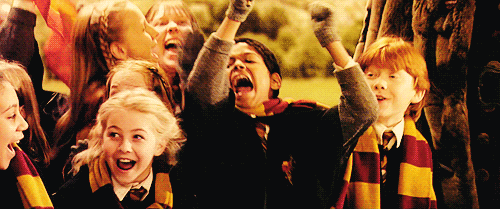
Why was Ginny attracted to Dean?
I think for this question it’s important to think about the timing of when Ginny and Dean became close and when they got together, and especially what Ginny was looking for during and after her relationship with King of Negging, Michael Corner. There are three weeks between the break-up with Michael and Gin getting together with Dean, so we can assume Ginny and Dean had already become close and maybe a little flirty when she was with Michael (Ginny Weasley likes to give herself a nice four-week breather between boyfriends, usually just in time to watch the early summer weather roll in. I for one respect the work rate and the consistency.)
Ginny is with Michael until late in her fourth year, until they break up after the Quidditch final in early June. Dean has his OWLs until late June (just realised Ginny dumps Michael right before his exams - this is how you get revenge on a Ravenclaw).
The events in the Department of Mysteries take place the day exams finish (cue iconic scene where Harry’s rushing up to the dormitory to grab his Cloak and save his godfather’s life and Seamus and Dean are trying to get him on the sesh, absolutely rate it, excellent from the lads). Ginny’s going out with Dean by the time she gets the train home, probably by the end of June.
Given the short turnaround time between relationships, I think it’s likely Ginny and Dean became close during the rest of the school year, where she was able to learn the following things about him (and implicitly compare him with Michael as Michael revealed himself to be, as the great prophet Ronald foresaw, ‘a bit of an idiot’):
Dean Thomas knows right from wrong (and really, really can’t stand Dolores Umbridge). In their first lesson with Umbridge, Dean is by far the person in the class who stands up to Umbridge the most after the trio (he actually comes out swinging a lot more than Ron does). He immediately subs in for Harry when Umbridge refuses to answer any more of Harry’s questions. He defends Lupin and Crouch-as-Moody when Umbridge criticises them (describing Crouch-as-Moody as a maniac but saying ‘we still learned loads’ is extremely funny - Dean's pedagogical expectations are low). Dean is an extremely enthusiastic DA member, he and Ginny often arrive at meetings or take part in dinnertime conversations about the DA together, and I think they likely became mates because they’re passionate about what the DA is trying to do. We know Gin likes a boy with a moral compass, a backbone, and a good sense of outrage in the face of injustice. (I cut this out of a much lengthier first draft of chapter one of Beasts, which had all the DA at the graduation ceremony, but this was their interaction in response to another character acting up: ‘[Ginny] feels an old rush of affection for Dean, a man who always had a good scowl in him when it mattered.’)
Dean’s a sweetheart, even if he’s a bit hopeless. Dean’s a character who is often trying to make people feel better about things and trying to give a bit of comfort – emphasis on trying, because he’s not always good at knowing exactly what to say. I think this is something Ginny would really value – she’s someone who, for all her fire, tries to comfort and support the people around her. I reckon she’s got a soft spot for a man with a heart in the right place and a chronic inability to find the right words to express it. ('“Don’t worry about it, Harry,” Dean muttered, hoisting his schoolbag onto his shoulder. “He’s just . . .” But apparently he was unable to say exactly what Seamus was, and after a slightly awkward pause followed him out of the room.' OotP, 221 - does this not sound like how Harry would try and comfort someone?) 👀
Dean is kind to the underdog. Dean is often seen hanging around with or partnering up with Neville, and in DH, we’ll also see Dean be very kind towards Luna. I think Ginny rates people who are kind to those who are socially awkward and excluded.
Relatedly... Dean loves Remus Lupin. I wrote about this a bit in this short reflection on Remus (and am writing about this at the moment so don’t want to get too spoilery if you’re reading Beasts…), but I have a feeling being Remus Lupin’s biggest fan would be a sure fire way to get a text back from Ginny Weasley.
Dean’s into sports. Like her soulmate, Ginny’s into fellow jocks (I think it's implied that Michael Corner was also on the Ravenclaw Quidditch team – three for three on Quidditch players, Ginevra, if you were on Love Island I’d say you have a type). I think she’d also be amused and endeared by Dean’s die-hard commitment to West Ham - she is Arthur Weasley’s daughter, after all, and she probably enjoys teasing him about how crap football sounds. (That bit in PS/SS where Dean’s yelling ‘send him off, ref!’ – 10/10 excellent Dean content). Also Dean does not seem threatened by Ginny’s Quidditch abilities, but instead just really wants to be on the team with her too, which is a nice change from Michael Corner, the Jack Berger of Hogwarts Quidditch. (Sorry Michael, I know you end up a gold star goodie by DH, but young Mike is a prick to our girl Gin).
Dean is a laugh. Chuckling at Ernie Macmillan in his Apparition classes, mucking about with mice in Transfiguration, getting the giggles because this Lockhart bloke has set a quiz asking students to name his ideal birthday gift: Dean is both fun and funny. That bit in GoF where Dean describes Warrington in Slytherin as a ‘big bloke who looks like a sloth’ – funny. The bit later in GoF where Dean rinses Harry for rejecting that curly-haired Hufflepuff girl who wants to go to the ball with him – also funny. Ginny Weasley likes a comedian and she also likes an audience. I think that means a big tick in the Dean Thomas column.
Dean's a creative. This is verging on headcanon territory, but I really do love the idea of Ginny finding her way back to writing in the years after Riddle and the diary. I can see her being drawn to someone who also has this gentle, expressive, artistic side to them.
Dean’s not averse to dealing in contraband Firewhiskey. If you’re a fourteen year old popular girl with a rulebreaking streak, the boy who can source you some Firewhiskey for an end of exams party from a cool kid like Harold Dingle is hot property.
Dean… er, really likes Harry. Not Gin's finest criteria for a boyfriend, but I think In GoF, the man draws Harry flying around the Horntail on his Firebolt and draws Cedric, his rival, with his head on fire. It’s not a hugely good look for Ginny, but I reckon Dean really liking Harry probably, in a strange, back-to-front kind of way, is another vote in his favour (Gin, you're messy, and I love you for it).
What was their relationship like?
I loved thinking about this question! It’s easier to write about why Ginny and Dean broke up than it is to write why they stayed together so long, and what good stuff they took from the relationship. Dean's easily bashed in Hinny fic in all sorts of different ways, and I don't think it really tallies with the really positive impression we get of him in canon. Ginny and Dean spend a lot of time together over the year - eating most of their meals together, training together, spending all of their Hogsmeade time with each other. I know it’s a teenage relationship, but this is still so much time to spend with one person. It also actually takes them quite a while to breakup, even if they’re ‘rocky’ for much longer. There's something to their relationship that must, on some level, have worked quite well. After all, it would have been a lot easier for Ginny to have dumped Dean if he was a crap boyfriend. It’s much harder to dump someone who is a good partner, but not the right partner for you.
I think that's the problem for Ginny: Dean was kind of perfect for her in lots of ways - but for the person she would have been if Riddle hadn't happened to her, and if the war hadn't happened. Their relationship was clearly based on a lot of mutual attraction and chemistry (that kiss Ron and Harry saw was intense, lads - there's a reason Harry was threatened by it, after all). I think Dean was proud as hell of Ginny, especially on the Quidditch pitch (he's so excited to tell her he's going to be on the team with her!). I think he would think she's super cool, and I like fics and headcanons about Dean that show him trying to internalise his feelings about his own dad into doing right by his girlfriend, even if that means overshooting and being overly chivalrous and over-protective with Gin. I think one of the reasons Ginny stayed in the relationship so long is because they genuinely got on, had a laugh with each other, and fancied each other, in a way that she would feel conflicted about when she still feels drawn to Harry.
Really I think it's Dean being so great that is the problem for Ginny. If she's with this really great guy and she's still feeling restless and like something's missing, she knows that means she's still not over Harry, and that means she's in trouble. I think it's why Ginny sabotages the relationship, in very understandable ways, and in the end she finds herself getting the ick over little things, and picks a fight to end it rather than come clean about being in love with someone else. (No judgement: again, messy girl representation is important).
Ultimately, I think Harry is perfect for the Ginny that actually exists, and Dean would be a good match for a hypothetical Ginny where there was no Harry, who doesn't have a family in the resistance, who doesn't have all this trauma from what happened with the diary, and who isn't shaped and forged by a childhood at war. Until DH, Dean doesn't seem to know anything about the Weasleys' involvement in the Order. We have no evidence anyone other than Harry, the Weasleys, Dumbledore and Hermione ever knew Ginny was possessed by Riddle, and I don't know that Ginny would volunteer the information to Dean. (The only reason she brings it up to Harry in OotP and again in HBP isn't because she wants emotional support for it - she only brings it up to try and help him. This is not a subject she talks openly about even with the person who knows most about what went down). This lack of knowledge about crucial parts of Ginny's life would mean huge gaps in understanding between them - not gaps that are Dean's fault, but that Ginny doesn't try to get him to bridge. Dean can't meet Ginny where she's at emotionally at the point in the series where they get together, in many ways because he's much closer to a normal teenager than she has been able to be up to that point. At the end of the day, Ginny's always going to want to be with the strange guy racing to the Department of Mysteries to rescue a loved one and fight Death Eaters on a Friday night than a nice normal guy who is planning on drinking his own weight in Firewhiskey to celebrate him finishing his Wizarding GCSEs.
How did it help them for their next partners?
I think Ginny would always speak highly of Dean, appreciate that he made her feel loved and someone a boyfriend should be proud of, and I think she would feel some guilt about what went down. I think, eventually, Dean would acknowledge that he didn’t fully understand Ginny and what she was going through, and that he couldn't have been able to meet her needs in the same way Harry could. (I do think this would take a while, though - on the way out, Dean would be understandably very bitter, even if bitterness would be quickly surpassed by the much more serious escalation in circumstances in the war for an apparent Muggleborn. Thinking about it, Dean Thomas had a terrible 1996. Man got dumped and then within three months was homeless and on the run from a murderous fascist regime trying to do him in. Like, I know this is very much not funny but… if a man I had shared a bedroom with for six years and called a friend publicly scooped my ex from me from under my nose, dumped her a few weeks later for mysterious reasons, and then I had to look at his face everywhere I looked on wanted posters, I would be a lot more mad at Harry Potter than Dean Thomas ends up being).
Ultimately, though, I think both would look back on the relationship as a sort of sweet teenage thing, with a lot of warmth and humour to it, probably some sweet confidence-boosting intimacy early on, and a bit of a lesson that you can't make someone be the right person for you. I like to think Ginny and Dean end up mates, in the end, and that she's always rooting for him to find someone great.
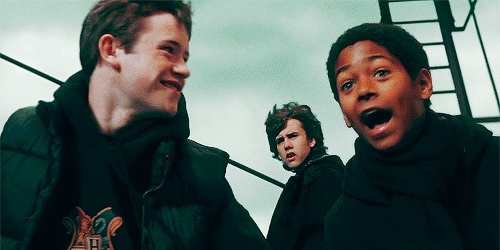
#and that person... is seamus#joking but not really#dean thomas#meta#beasts#this was super fun to think about thank you!#dean thomas supremacy#ginny weasley
193 notes
·
View notes
Text
Elvis (2022), culture of celebrity, Greek heroism, idolatry, and dehumanization.
So this Christmas my Gramma got Baz Lurhmann's Elvis Presley biopic, aptly named Elvis, in her stocking. I watched it with her, and then I watched it again three days later, and then a third time a week after that. Since then it's pretty much been keeping me up at night. I felt like I had to get my thoughts down, even if this just lives in my drafts for all eternity. So here we go; I've never written a long-form meta like this, and I'm really just emptying out my brain at this point. (Long post).
1. Elvis as seen through the eyes of the man who killed him (or did he?)
The movie begins in Las Vegas in 1997, and we are immediately introduced to an old man who's just collapsed from a stroke. He's rushed to the hospital in an ambulance and in his stroke-induced, fever-dream narration he describes himself as Colonel Tom Parker, the man who gave the world Elvis Presley. This narration is interrupted by loud voices of accusation and glaring headlines flashing across the screen, which accuse him of abusing, manipulating, overworking, and ultimately causing the death of Elvis Presley. He sits up quickly in his hospital bed, looks out at the Las Vegas cityscape, and tells us not to believe what the newspapers say about him. He declares that he did not, in fact, kill Elvis, and begins to tell the story from his point of view.
Now the first time I watched this movie, I was overwhelmed and slightly put off by the off-kilter pacing, and having read some reviews, I can see that many other viewers were as well. The first half of this movie is frenetic, erratic, impossibly quick-paced, bright, colourful, and has little respect for chronological order. These are the frantic, confused, morphine-induced ramblings of an old man on his deathbed, allegedly trying to set the record straight concerning the serious allegations which have been plaguing him for decades.
Something happens in the middle of this movie, however. After the victorious emotional and career peak of Elvis's '68 Comeback, the tone of the movie takes a turn. The pace slows down, the colour scheme loses its lustre, and there begins a growing sense of unease and dread. Something terrible is coming. It's ominous. Even if the viewer knows nothing about Elvis Presley, the opening scenes of the movie have already told us that he dies at the end. The main character of the story is nearing his end, and the storyteller on his deathbed is also nearing his.
So Elvis dies, and we get to the end of Parker's tale of self-defence. The only problem is, while he's been telling the story, we've been watching the story, and it seems beyond obvious that the Colonel is exactly what the shouting voices accused him of being at the beginning of the movie: a liar, cheat, and conman, guilty of causing Elvis's death. His final statement is easy to throw away as just another lie, "I'll tell you what really killed my boy: it was love, the love he felt from you, his fans." We roll our eyes in disgust and hope that he dies soon.
But wait. What does he mean by that and could he possibly have a point?
2. Celebrity culture, idolatry, and dehumanization.
I love a good story that accomplishes more than one purpose and tells more than just one story. Elvis tells the story of Elvis Presley, sure, and Colonel Tom Parker, and American pop culture, and the history of American music. It also tells a story that's been played out in real life, film, and television many, many times. The story of the meteoric rise and cataclysmic downfall of a beloved celebrity, a cultural icon, a superstar. What causes the downfall? Well, Parker claims that the culprit is love, specifically, the love fans feel for the celebrities they idolize. I found this movie to be a compelling examination of the dangers of the most prevalent form of idolatry in our culture: celebrity worship.
Before watching this movie I thought I had a pretty fair idea of who Elvis Presley was. I grew up in North America after all, and watched television, and you know, existed. I grew up listening to his Christmas album. I grew up watching Full House, in which one of the main characters, Uncle Jesse, is Elvis Presley's biggest fan. Since I can remember I've always been able to identify pictures of Elvis, and his voice. I can sing along to many of his songs. Many years ago my Gramma acquired a box set of all of Elvis's movies; I've seen bits and pieces of quite a few. Because of the internet, I've learned many commonly circulated fun facts about him, things like, "He was actually blond," and, "He was a legit federal agent," and, "He loved peanut butter." White sparkly jumpsuit, slick coiffed black hair, sideburns, curled lip, funny voice = Elvis, of course.
He is one of the preeminent members of a class of celebrity all on its own: the cultural icon. I wonder if some people don't think about the fact that "icon" is a religious word. In the minds of most people, and in the view of pop culture, Elvis Presley is no longer a human being just like anyone else; he has been reduced to a costume, an easily recognized symbol. Of what? Depends on who you ask. A symbol of America, or good, or evil, or Hollywood, or rock 'n roll, or Las Vegas, or teenage rebellion, or wealth, or a sex symbol.
What happens when a human being becomes the object of another human being's worship? They become just that, an object. Forms of worship include adoration, attention, devotion, money, and sex. They are offered in the name of love, and are often received as love. Our unreliable narrator makes the probably-true comment that Elvis became addicted to the false love, to the point where real love could not compare. Worshipers then feel entitlement to receive certain things back. The idol's life becomes public property, an open book which must be available for a photo shoot at all times, no matter how invasive. Fans swarm the gate of his private home, climb trees to peer into his window, refuse to watch a movie in which he doesn't sing, and photographers must capture his grief after his mother's death, and his haircut and physical exam before entering the military. Both the worshipers and the idol are eaten up by the vicious, dehumanizing cycle, which bears the pretty name of love.
We are invited to consider: did the consumeristic, idolatrous culture, which has a tendency to see people as products to be bought, invite the meddling of wicked, opportunistic men like Colonel Parker? Or did the wicked men, who package people up and market them as products to be sold, engineer such a culture?
3. Greek Mythology, the American Dream, and Elvis Presley.
Typology and literary archetypes are my jam. I adore how movies can play with these concepts through imagery and music. One of my all-time favourite movies is A Knight's Tale (2001). A Knight's Tale is about a peasant who masquerades as a knight and achieves fame, wealth, glory, and love. The director wanted the story to resonate with modern audiences, so he decided to portray knights as the medieval equivalent of rock stars. The movie utilizes symbols, metaphors, costume clues, and a killer soundtrack of classic rock songs to reinforce the idea that we are watching not just a movie about a knight, but also a movie about a rock star. The audience is invited to make inferences and assumptions based on what we know about the rock star archetype.
Baz Luhrmann made a comment in a behind-the-scenes interview, that Elvis had a mythic, hard-to-wrap-our-minds-around life, one that conforms to both the ancient Greek heroic tragedy and the American Dream narrative. So naturally I am obsessed with this idea. Let's get into it.
i. Greek hero stories, glory, the classic character arc.
I'm not an expert in Greek mythology, but I'm no slouch either. The ancient world greatly valued this thing, which has many names in many different cultures. You can see it in Genesis, the concept of having a great name, and the power that comes with it. It's a not-quite-abstract but not-quite-actual, metaphysical substance. For the Greeks, we'll call it glory. Glory is gained by accomplishing heroic feats: killing monsters, fighting in wars, and going on quests. Glory comes with fame, reputation, power, respect, money, women, and often supernatural abilities which give the owner the ability to accomplish more heroic feats, thereby gaining more glory. It is the vocation of heroes to pursue glory. Along with the ability to pursue glory, comes the desire for more. The more you have, the more you want. In fact, it's almost addictive.
The other thing about glory: it's corruptive. The longer you have it, the more things you are willing to do to get more, and the more power you have to do those possibly morally dubious things.
Most Greek heroes were demigods. They were born with a little bit of glory already inside them. This compelled them to seek more glory, and since they were demigods, they had a leg up when it came to getting it; they already had some supernatural strength and a powerful parent. They did heroic feats, achieved glory, received the power, fame, and wealth that came with the glory, were compelled to seek after more, and so on and so forth. Most Greek heroes had one or a mixture of two fates. 1) They died. Either they were in a situation where they were prevented from seeking more glory, so they wasted away, or they were killed in the pursuit of glory by an enemy, monster, or possibly by another hero. 2) They became corrupted. This often happened in ironic, cruel-twist-of-fate ways. One of the villains they fought in their youth was an evil king who murdered his own children, so somehow they ended up becoming a king who murdered his own children, something like that. You know the story: "You either die a hero or live long enough to see yourself become the villain," or the classic, "You've become the very thing you swore to destroy."
ii. The American Dream Narrative.
A common literary trope, the American Dream story is appealing and inspirational, at least at first glance. The structure is pretty simple: The hero is born poor, with nothing but some talent and/or charisma. Due to a mixture of savviness, charm, hard work, and luck, the hero rises to the top and achieves the Dream of money, renown, independence, and freedom. The deconstruction of the American Dream is just as common in fiction. There's a catch, things don't go according to plan, the illusion fails, your luck runs out, etc. There is both so much hope and optimism, and so much mistrust and jadedness surrounding the American Dream. Can it be real?
iii. Elvis Presley.
Elvis was born with a little bit of something. He was born with beauty, charm, and musical talent; a star quality. These qualities of his drove him to use them. Nothing huge at first, but he always had high aspirations; he believed he could go somewhere. The more heroic feats he accomplished (performing and recording music and making movies), the more glory (or fame) he got. The more glory he got, the more he sought; gradually it became addictive. Soon, the corruptive quality of the glory reared its head.
Imagine an arc; the glory propelled him to the top of that arc, along with everything else the glory promises: money, fame, recognition, love, women, power. Up to a point, the glory is a positive force, but once the hero reaches the top of that arc, it becomes a more sinister thing; it starts pushing him down the other side. It starts to corrupt not only the hero but the people around him. While on the upward climb, the glory is like a magic elixir that grants wishes, but on the descent, it becomes more like drinking poison. Elvis's drug addiction and eating disorder seem like an on-the-nose literary device to symbolize this, but no! It happened.
What about the American Dream? He's the poster boy! Born absolutely dirt poor, with nothing but some talent and a dream. With a fortuitous mixture of charisma, hard work, meeting the right people at the right time, and being in the right place at the right time, he rose to the top. He also managed to nab (or be nabbed by) a business-savvy manager with a carnival background. It could only be the American Dream because Elvis, his music, his career, and his fashion were all uniquely American; he couldn't have come from anywhere else in the world, at any other time in history. Rock 'n Roll, the US Army, Hollywood, and Las Vegas, are inseparable from America.
I saw a person saying that the message of Elvis is that the American Dream is unattainable, but I disagree. It is attainable, but that's not the whole story. The movie presents the American Dream more as a deal with the devil. You'll get everything you ever wanted! But then you'll have to pay the price. To gain the American Dream is to open yourself to the ravages of American consumerism and celebrity idol worship. It's to make yourself vulnerable to the vultures, while you fatten yourself on the riches they feed to you. I don't think the movie portrays Elvis as a completely duped, innocent victim. While he was sometimes force-fed the glory (or the pills), many times he swallowed them consciously, willingly, losing the people who were actually looking out for him and truly loved him to forces outside his control, or due to his own choices. He was not immune to the corruptive power of fame and glory; no one is. That's the tragedy.
Anyway, I don't know how to conclude, but this isn't a school assignment so who cares? Baz Luhrmann is a genius, wow what a good movie, I can't wait to watch it again, I didn't even say anything about the soundtrack or Austin Butler's awe-inspiring performance, I love you Austin Butler,* I wrote this instead of a book report for school, it was worth it, I don't even care if no one reads it, I had fun, now to get on with my life.
*edit: his work, that is, and I admire his devotion to his craft. My point is not that we can’t be fans of celebrities. I believe that ALL human beings are worthy of love and dignity, NO human beings are worthy of another human’s worship, and such an attitude is as damaging to the worshipped as it is to the worshiper, and that SOME human beings, by virtue of extraordinary talent, are worthy of additional respect and admiration. I respect and admire Elvis Presley, Baz Luhrmann, and Austin Butler for being talented artists. The English language being what it is, love is the word we often use to sum all that up, but seeing as I just wrote this whole thing, I thought I’d clarify ✌️
#my first meta#elvis presley#elvis 2022#baz luhrmann#baz luhrmann's elvis#analysis#movie analysis#thats the fastest 2400 words i've ever strung together in type format#long post#ok im posting it now#i think thats about all i had to say
27 notes
·
View notes
Text
Time and memory
This is more a pondering out loud than any theory or idea I necessarily subscribe to at this point, but there's something about time and memory and the wackiness of both through season 2 that has me thinking and full disclosure: This is not a complete thought.
I have had this post sitting in my drafts for about a month because there's some connection my brain is almost making, but can't quite. And during that time a whole lot of ppl have delved further into the time and set/prop inconsistencies, so this post is a little bit sharing a whole lot of the metas I've had the pleasure of reading, and also an attempt to share my own thoughts on it all.
There are amazing posts delving into the time inconsistencies already (like The ineffable discontinuity of time in ALL of Good Omens season 2? and the other work @embracing-the-ineffable has linked in their pinned post that explores this and @indigovigilance's look at Continuity errors is another one).
Then @cobragardens points out these extremely sus time-related situations in 5 Good Omens Timefucks that Haunt me
Then others have pointed out inconsistencies in prop placement, costuming etc, such as They are out of order by @maufungi and @purplewillowchicken's observations about Crowley's chair in the bookshop
But then, THEN, Neil answered an ask about Crowley's knowledge that hand washing would become all the rage during the Edinburgh flashback and his response here (incl. the excerpt "Either [Crowley] has an understanding of science and the world, or he has visions of the future. Or he read up on the ineffable planning a long time ago. Your call") could indeed be very Gaiman-esque teasing or it perhaps a little bit of a hint.
When you take in how many time discrepancies or inconsistencies (whether this is prop or costume inconsistency/changes or timeline ones) there are throughout season 2 and consider that this is a show that is deliberate and fastidious in it's inclusion/exclusion of any details, it has to make you wonder.
Also, in the book of Good Omens, Crowley's watch shows the time for Another place as, "it's always too late" and it's stuck on one time. But in the series, we've never had reference to his watch in this way and the line, "It's always too late" said by Crowley in season 2, is, to me at least, quite ominous, almost defeated, like it's something he contends with often.

There is something about the way he says that line that struck me on first viewing and continues to on every subsequent watch. It's not just that the meaning is a little ambiguous; too late because Aziraphale is already in danger? Too late because they've always been in danger and they're simply staying one step ahead? Too late because no matter what Crowley and Aziraphale do, they're part of a bigger plan that they have no control over or ability to slow down? All of the above?
The way Crowley says, "it's always too late" comes across as quite personal to me. Like he feels responsible. Or, if we're going to go with some timey-wimey bendy-wendy stuff, it's like he keeps falling short of preventing or achieving something he's being trying to achieve for a long time. He sounds deflated.
And yes, it could be the constant looking over his shoulder and never finding peace, absolutely. As I said right off the bat, I don't necessarily believe what I'm writing is true, but more of a fun little "what if?"
There have been theories about time loops and the idea that Crowley (or everyone) is stuck in a loop, and I could see how memory could come into that. I don't necessarily think Crowley's memory has been tampered with by Heaven or Hell, but the idea that being in a loop impacts memory, and that each time he goes around it shifts or alters memories depending on what has been changed etc, totally tracks.
Part of me thinks that playing around with time loops etc is a bit out of GO universe, but then I remember that Crowley stops time and that is pretty darn significant, so anything's possible?
So what I'm throwing into the mix is this - what if time and memory, specifically Crowley's, are somehow connected? More specifically, his involvement in the creation of nebulae aka space, sort of attached him to different timelines? Or allowed him to travel through time in different ways?
Yes, this is whackadoo, but he can stop time, possibly manipulate it, what if he can jump around in it too? What if, just like Adam resetting the Earth, essentially setting it on a new trajectory and timeline, Crowley finds himself in different timelines at different times, trying to get to the one where Earth is safe, he and Aziraphale are safe, where it's not too late?
And what if he's either not aware of it or doesn't know which timeline he's ever in until it is too late? And that's why he doesn't recognise Saraqael and Furfur. Or, what if he has indeed seen the future and is desperately trying to alter the past to avert whatever he's seen? But in doing so, any changes mean that present Crowley doesn't remember these angels and demons he doesn't recognise, because they are a result of trying to alter the outcomes of the future?
I think this is all far too sci-fi and quite unlikely but, if I was going to humour myself a little more, the comment Crowley makes to Maggie and Nina, that he and Aziraphale have been talking for "millions of years" - I always took it at him just exaggerating the time they've known one another to make a point (which, honestly, I still think is the case). But if I wanted to support my own out there idea, arguably, if Crowley was travelling back and forth through time, trying to do whatever he's trying to do, then perhaps he really does have millions of years of conversations with Aziraphale under his belt?
And that's why sometimes props are different or in different places - something's been altered in the timeline and it flows into the present. Then of course there's the idea that the Metatron or God or some entity is manipulating time and messing with everything, again, maybe *insert shrug emoji here*?
Though I do keep coming back to Neil's comment about Crowley having visions of the future. Perhaps it's not so much travelling through time, as being able to see through time? I mean, there's the whole scene that never happened with the dream of the bookshop standing alone amidst destruction and while it's never been said whose dream it was, if I was a betting person, my money would be on Crowley. Ya know, the one who has visions of the future. Because Earth destroyed while the bookshop still stands would certainly explain the "it's always too late" comment too.
So that's the end of my half formed not-really thought. It seems ridiculous to write such a long post about something I'm not particularly convinced about, but I certainly agree there's something funky going on with time and the memory thing bugs me because it's not consistent enough to be a memory wipe situation (I don't think), but it's been made obvious enough we're meant to notice. Either that, or Crowley is just being a smartass which, honestly, is far more likely.
#good omens meta#good omens#crowley#this is a rambly ramble that sort of says nothing in the end tbh#because I cannot for the life of me quite land this thought#al I know is that something is up with time#and my brain wants to know what it means
32 notes
·
View notes
Text
Why Nick Nelson in Heartstopper is groundbreaking bisexual representation :
I'm sure most of this has been said by now but I was in the mood for fluff so I did a re-watch and like, bi rep is A BIG THING i want to talk about on this blog so I felt I had to lift this draft out of my graveyard of unfinished meta essays and finally finish it :
Very basic but a male bi character who explicitly calls himself bi and not as a stepping stone to another label ? Still unfortunately too rare
It's an old cliché but for a very long time, bisexual characters were presented as manipulative, mentally unstable, unreliable, two faced, flaky, cagey, hiding something, etc ; often con-artists, addicts, liars, cheaters, if not outright psychopaths. Even the positive characters tend to have a ton of secrets, chameleon abilities, hidden pasts, etc. Nick Nelson, meanwhile, is a human golden retriever. Yes he's a bit confused and he makes mistakes, but it's never not obvious that he's a sweetheart who means well and is trying his best to be a good person. He's so protective and gentle towards Charlie, and you can tell that once he figures his shit out he's going to be a dream boyfriend. Also he's kind of basic and a bit of a dumbass at times ? In the most positive, endearing way possible. He's honest and straightforward and reliable, he's not crafty or tricky or slick, and that's just great.
At it's core it's a story about the butterflies in your stomach feeling of first love, a cute and endearing romance - not a genre you often see bi characters in, who used to be confined to stories about raunchy sexual experimentation, threesomes, etc (As a bi teen it's all I got and honestly it contributed to me not taking my own sexuality seriously for so long) Here there's none of that shock/scandal factor - Nick gets to be a little romantic hero that stands in the rain getting drenched because he is so overcome with feelings, like he's replaying Pride and Prejudice. It's adorable and it's humanizing, like good romance is, flaws seen with empathy, characters allowed to be vulnerable and complex and not some spicy episode of the week.
It's not prudish either like the chemistry between the actors is super believable and also - it's so obvious that they are absolutely delighted to be in each other's presence !!! And honestly more romances, queer or straight, should be like this. Like it should be obvious that the characters are just this absolutely giddy at seeing each other and being close - and that's too rare.
Linked to this, having a bi character in a story aimed at younger teen audiences, that is sweet and non explicit - ofc we still need portrayals of queer sexuality, but unfortunately that's all bi people used to get for the longest time, as something considered intrinsically 'more adult' - and that's bullshit ! there are bi kids who need stories like this !!!! And being bi is about love just as much !!! I'm so glad this show exists !!!! Showing that it's okay to take your time with these things and that even holding hands can be a big deal and that's wonderful !
Also related to this - a lot of the more positive bi representation tends to also sort of become this cliché where they're all these flirty, confident, seductive super badasses, often adventurers or superheroes. (Ok I like those characters and the idea that being bi automatically makes you cool tbh). But it's a lot of pressure. Normal regular boring bis also need representation. Nick's not boring, he's a little star athlete, he's probably the coolest character in the show lmao but he's still a regular kid and that's nice.
Which little baby bi hasn't had those feelings about Keira Knightley and Orlando Bloom in PotC, huh ? Most relatable moment of the show for me lmfao brilliant - that sense of overwhelming 'oh no they're all hot' is bi culture!!!!! yes!!!
His process of figuring out his sexuality is taken seriously !!!! Man this made me cry a little because - yeah, again, most bi characters nowadays, even when they're good rep, they generally have everything figured out because their sexuality is seen as them being more liberated and enlightened and honestly I think that's kind of problematic, even if well meaning ? It trivializes the particular struggles of being bi, like it's just 'gay-lite' and they end up being mentors of gay characters and side characters whose individual stories are easier, more simple/less interesting and honestly I feel like in reality that's anything but true. Nick gets an episode to confirm that yes, he's still into girls and his feelings for girls earlier are not erased by his attraction to Charlie. Bisexual identity doesn't change or disappear depending on who you are with.
that part with the youtuber explaining that bisexuality at first is often an experience of constantly second guessing yourself !! yeah !! that was so real ! I was in that phase for such a long time, and seeing Nick attain a stage of certainty rather quickly was so nice to see - important also to see that his mother has a sort of reflex to tell him he 'doesn't have to say he's into girls' because bisexuality is generally conceptualized as a stepping stone and he explicitly corrects her. It's a big deal ! And that's important because I feel a lot of bi people feel less valid than gay people and that they have to minimize their own experiences/not make a fuss so as not to appropriate/take attention away from 'real queerness' or something. And that has real consequences in terms of self-image and mental health and community support. So yeah, the narrative giving it weight and time is really groundbreaking. It's just treated with such nuance and respect. It's wonderful.
Honestly in general it's very common for bi people to figure out their sexuality at a later age than their gay peers, because having crushes on the opposite gender means you are less likely to question yourself. Nick needing time to figure things out isn't presented as a bad thing, it's Charlie's specific history of being hurt by this before that makes the situation difficult for him. And the fact that it ties into him also realizing he was just going with the flow not really being true to himself - questioning your sexuality can also have a ricochet effect on how you stand in the world and - yeah I just thought the whole thing was so realistic and true to lived experience.
The reason Nick agrees to go on a date with a girl is not because he's two-timing Charlie but simply because he cares too much about her feelings to let her down in front of everyone or because her dog died (and he brings his dog to console her when he goes to let her down !). His main character flaw is that, by virtue of being a popular, athletic jock, he's oblivious to the shittiness of his friends - you get the feeling that he's a sunny, happy guy used to breezing through life, who probably prefers to get along with everyone, and that might have insulated him from certain realities, but he's still a very caring person. And he tells the truth to Charlie and makes it right pretty quickly. It's a very good send off of the trope of the untrustworthy bisexual who was secretly dating a girl the whole time. Meanwhile Ben, one of the bad guys of the story, who was dating a girl and treating Charlie like shit because he hates himself, and could be a bad bi cliché, isn't given a label, which I think was a smart writing choice.
It's just great queer rep in general because it centers queer joy so powerfully, it's sweet without being saccharine - difficult topics are talked about with nuance, it doesn't hide or minimize real hurt and prejudice, but it gives more time and importance to its characters being happy and giddy and in love and having fun, which makes it feel so safe and soothing to watch. Elle's story is another example of this - her specific experiences as a trans girl who recently changed schools are central to her story, but she also gets to be a regular teen girl who has a complicated crush on her best friend and stresses out about making friends at her new school and gets milkshakes and arcade games with her squad. It's great.
And yeah this general celebration of queer friendship and mutual support is super important to a good bisexual representation too - Nick's amazement and relief at seeing Tara and Darcy kissing publicly - like !!! which closeted baby queer hasn't felt that exhilarating sense of possibility and belonging and yearning and awe at seeing other people being gay and in love in public ! That was so wholesome and beautiful - and him being so eager to talk to them afterwards, adorable. Because being openly yourself often has that sort of domino effect on others. Seeing other people doing it, makes it become real for you, too. I think this is also especially important for bi people, because they tend to be more alienated from the queer community as a whole.
So yeah so much love for this show - I've followed the comics for a long time and they are also wonderful, but the show added its own brand of charm and heart, and I'm so happy it exists. It makes me a bit sad too, nostalgic for an experience I never had, because my own experiences were so different, the reality I grew up in as a bi teen was so much meaner and more bigoted and violent and vulgar and lonely, but even if this show is probably not the reality for a lot of baby bis still, it gives me hope we are moving in the right direction. <3
571 notes
·
View notes
Text
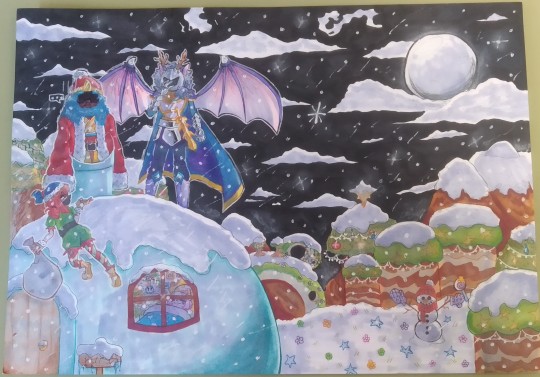
i knew i said i would be more active but i was kinda busy with school, but now i've gotten my winter break so i think now i should be able to post more often.
this was a prject for art class where we had to draw what we wanted for christmas, got the highest grade on it!
i was planning to post this earlier but i kinda fell asleep, my sleep schedule is absolute bs at this point but im tryna work on it, kinda.
oh yeah the drawing, gonna talk abt it now, its based on that one kirby twitter image they posted for christmas, i think it was the 2018 one, not sure rn. dedede just put on a belt, thats it, he already looks like santa, bandee is all in spirit with an elf costume and meta had to be begged by bandee to at least put something holiday related on.
sorry its blurry, i couldnt get a better pic no matter how i tried
we also did something similar for halloween
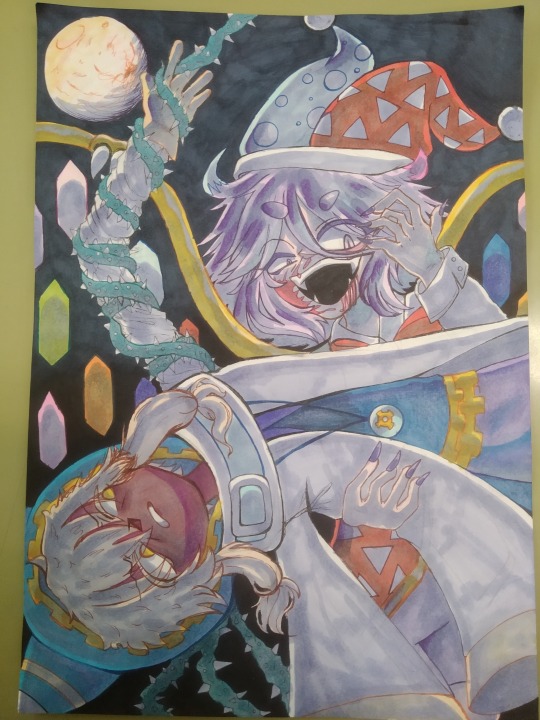
btw marx and mags kissed after this, trust me im the moon.
i dont really have my gijinkas defined aside from kirby, marx and bandee, tho im starting to try to redesing them, but yeah, meta, dedede, and mags could change (i mean, mags already changed here, i used to draw him with short brown hair, but i like this hair better) dunno if it easy to understand, i suck at explaining stuff
i also finished magolor epilogue today at like, 4 am in like 4 or 5 hours and maaannn i loved it, i want to replay it from scratch but i dont wanna delete my save data nor have to replay all of story mode in another save file. i have all stages platinum except hydriath, who is on gold (i swear i'll get you one day!) no matter how i try i can never keep my combo long enough for platinum. when i finished it, i felt kinda empty ngl i wanted more, but didnt feel like trying extra mode or doing the challenges, or really anything i had left to do in krtdldlx
so i checked my ao3 cuz it had been a week since i had and remembered that i had a draft i wanted to post that i only had there
i lost the draft
so i just check my favourite tags and oh look there is another addition to my favourite series there, but i think this is for another time, better when i post a fanart of it
#fanart#art#kirby fanart#kirby#silly#meta knight#king dedede#bandana waddle dee#marx kirby#magolor#traditional art#kirby gijinka
24 notes
·
View notes
Text
Okay, so I’m gonna get a little meta here. ARGs take a lot of time to set up properly, and a complicated one like Quackity studios dropped this evening? That probably took days to draft up, at least. Quackity has had the idea of QSMP in his head for years and he’s not been on the server all that much because I bet he’s doing a lot of behind the scenes work to keep this digital DND game running.
However, it has been shown multiple times that he can and has been blind-sided by his players: see, the eggs. And the nutso level of attachment everyone has to them.
As such, I’m a little worried that Cellbit solving the bulk of the ARG up to question 4:00 in one night be another oversight. Exactly how long was this ARG supposed to last for? Will solving this accelerate the plot faster than would make for a good storyline and will Quackity have to scramble to find a way to pump the brakes? Cellbit is like, *the* puzzle master of the Brazilian streamers that Quackity could have reasonably picked from, but it seems like the invites to the QSMP only went out within a few weeks of the Brazilians actually joining the server. They weren’t even told who would be on it, based on the fact that Cellbit was shocked to see himself on the same server as Badboyhalo again.
As such, was Quackity intending for this to be solved fast, knowing that Cellbit loves puzzles? Or did he intend for it to be solved slow and he underestimated Cellbit?
Basically what my concerns boil down to is will Quackity be able to swing this to make the plot better? If he planned for a quick solve, great! If he didn’t but can improv with the best DMs, great! But I really, really hope that he and his crew can pull this off right and not have to scramble to generate filler.
And I, for one, would not be surprised if this ARG was intended to be some of said filler and that the next bit isn’t actually ready yet. Hence the filler. I don’t want a rush to the next plot point if it isn’t ready, nor do I want Quackity to chew through all his filler in an attempt to stall.
So far Quackity and crew has managed to roll with the punches, so I have faith in them, but I’m allowed to worry a little, I think.
(Regardless, all this ARG stuff? And the time, effort, and attention put into everything so far? This is SO COOL.)
90 notes
·
View notes
Text
Does anyone want to adopt a fic? I’ve got something in my drafts that I’ve been working on for over a year and while I really love the idea, I just cannot get it to work. It’s not really finished enough to orphan on ao3 but it’s also not vague enough to be just a prompt.
Anyway, here’s some long rambly - kinda meta - ideas/thoughts:
The original idea was the question ‘what if they had the monogamy conversation at a different time?’ And I thought it would be interesting if they were invited to hang out (and more….) with a couple in the building who were in an open relationship.
I feel like Ian would shut it down pretty quickly but he would then overthink and just have to bring it up to Mickey because even though he would be fairly confident that they are already monogamous and that’s what Mickey wants, he gets a bit anxious and just has to have the conversation for his own piece of mind.
Ian worries Mickey hasn’t had the chance to date around and experiment with others in a positive way, kind of echoing his previous s10 comments about being in love. While he doesn’t like the idea of Mickey with another man, he feels they should have the conversation. Mickey has no interest in an open marriage, he clearly states he wants to be monogamous.
Somehow, this spiralled a bit and I ended up writing a little exploration of sexuality. And the story becomes ‘is Mickey demisexual?’ Mickey admits he’s never really enjoyed sex with anyone other than Ian. That it’s fine/it scratches an itch etc but it doesn’t do it for him in the same way it does with Ian. Mickey thinks this is just something that is weird but Ian suggests there might actually be a label for it.
I didn’t write this bit but I imagine them googling and finding a label - possibly demisexuality. It takes them a minute to get their heads around it and they read the definitions of it.
Ian is curious if Mickey therefore “liked” him since he says that he enjoyed the first time they had sex. Mickey isn’t sure - but guesses he was at least interested in some way in Ian because he’d been obsessing over finding him because of Mandy and then had enjoyed stealing from the Kash and Grab because it annoyed Ian. He guesses he didn’t realise what these feelings were at the time.
I also included a bit about Mickey only bottoming for Ian - first because he couldn’t trust anyone in the neighbourhood/juvie/prison and it was better to make deals and top so that nothing got back to his dad, and then it still wasn’t safe in Mexico/there wasn’t much opportunity. And he would have been on his guard living in an unfamiliar place by himself. I’ve always thought that he probably only bottomed for Ian and that the biggest indicator of this was Byron. Mickey was out and proud and confident at that point but he still did not bottom. If he wanted to, he could have in a safe environment with someone who was not a threat. Sure, maybe Byron was just not at all interested in topping but I think it’s more than likely Mickey just didn’t want to do that with anyone other than Ian. Which brings me back around to the demisexuality idea and that he’s really not that interested in sex outside of Ian.
I was going to add in something about Mickey feeling he could do it with Ian the first time because he didn’t think Ian would be stupid enough to out Mickey as he would also out himself to the rest of the Milkovich family. Or that he just thought Ian was in the closet and actually trying to have a relationship with Mandy and therefore would not say anything.
Ultimately it’s kinda a story about monogamy but also kinda a story about sexuality and past experiences? I dunno if these thoughts make sense for their characters but hopefully people kinda get what I was thinking?
But like I said, I just cannot make it work, so if anyone is interested in taking bits and pieces of this or reworking/remixing it, get in touch and I can send what I’ve written via email. Or if you just wanna chat about this - I’d love to discuss any topics along these lines, so please do send an ask! 💖
16 notes
·
View notes
Note
hey hey, do you mind sharing your akiyama headcanons? just saw ur tags talking abt how theyre dark and im very interested!!!! your fem ryuaki fuels me in ways i cannot describe and i havent even played dead souls FHKGJG and your tanimuras have my whole entire heart!!!
Oh wow first of all THANK YOU for the ask!! It's been only couple days since I've discovered I've had them disabled all this time so I'm very happy I noticed it before you found my blog (,:
I've already complained a bit on twt that when I've started to write down ryuaki headcanons, it prompted me to make a 35+ pages google doc with meta on both of them 😅 It pushed me to write more fun drafts tho, so all is well, but it won't fit in this post for sure ahbfght
But ofc, I will share a little about Shun specifically. (TW for implied SA)
Akiyama... I have complicated feelings about him, because on the one hand, he got betrayed by his closest people, lost all the standing in society and lived as a homeless person for a long time, and that's a big trauma to have. But on the other... He's got back up by a miracle, and now he's trying to recreate the miracle for others. He assumes the role of a judge for other people while himself being too young, too flawed, having black and white morals.
(In Y4 I downright despised Akiyama when he refused a loan to an abused woman on the basis that she didn't want to apply for sex work, but in the same substory gave some cringefail guy 4 chances to complete the test just because it was amusing.)
But I've just completed Y5, and it gave me lots of food for thought.
First of all, from what I see, Shun here was written (rewritten?) as a more sympathetic character. For example, now when it's implied that he's gonna make some woman "use her body" for the loan, it means he's sending her to work on the construction site. Well, alright. I'll take the bad taste joke over previous cases.
There's also an important quest when Akiyama meets his former boss, who not only initially fired him on false accusations, which started his downfall, but also married his ex-fiancée. And Akiyama finally admits that at first, he wanted to use his position as a loan shark to be selfish and to get revenge, but got disgusted with himself after seeing some humanity and principles in the former boss.
So, here finally comes self-awareness about his actions. Interesting tidbit.
Another big part of the character building we see now: when he is alone in Osaka, without Hana around, he's a complete mess. His new office is dirty, he barely eats some instant ramen and clearly just uses the place to escape Tokyo and the responsibilities he created himself. If in Y4 we saw him within his element, managing Elise and doing loan business (with a messy table because he's just soooo quirky and lazyyy \s), then in Y5 we get to see a bit of what's inside his head. And it's not pretty.
He's clearly distancing himself - from Hana and his new yakuza friends, because they have their own lives to care about. (Tanimura too mayhaps, but this is a separate friendship that I also like to talk about a lot)
Aaand he escapes to his ugly nook to have his ugly depressive thoughts. Can't let them witness it, can he? They'd lose all the respect for him.
At the same time, he throws himself into helping Haruka with passion, because that's the thing he actually cares about, for the first time in a couple years. (He also provides her with some much-needed parenting about the importance of being selfish, because, being raised by Kiryu, she's entirely too self-sacrificing.)
And suddenly - he's lively and energetic again, he's bouncing off other characters, he risks his life for what he deems right, he's helpful, organizing, charming. He's everywhere.
(But he's also afraid to acknowledge that he's got too close to people again. So he's ready to literally die for them and Haruka's dream, but avoids calling them friends, settling for "acquaintances")
Not much needed to imagine that, after everything settles down, he falls apart again. Because in his head he's never really needed or too important for the people around. They carry on with their life and plans. Such as Eri, Arai, Yasuko. Even Hana got fed up and left at some point, and has been keeping him at an arm's length since. (Good for her, that was unhealthy)
He's not only not that interesting, his trauma is "ugly" (by his self-admission). It's not heroic and it's very mundane. There's no clear villains to blame, like with Majima's torture in Y0.
It's just - waking up is hard. Akiyama can't see the point in much of what he's doing anymore. Money is just paper for him now, they might have bought him the freedom of choice, but somehow it didn't help. Even with all the financial help to struggling people he can't buy healing for himself. Most alive he felt actually was when he lost the money briefly in Y4 - it made him work to get them back again.
Now it gets a bit tricky, hence the TW.
I think that a lot of things about him actually make sense, if while living on the streets, he had it bad enough to the point of selling himself for food. Like, I don't want to make it into torture porn or downplay the traumatic experience of homelessness overall, but something for sure ruined him and his self-perception. That's why he's bouncing between playing a self-righteous entity and hating himself.
Aside from his crippling depression from all this being shunned deep inside and not addressed, there's the attitude about sex work I've mentioned he has in Y4. He is distancing himself from the situation yet again. A little bit of a trick to calm his mind: "If I treat it like every other job, it won't feel as dehumanizing applied to myself". And also: "Well, I was not above doing that! I was not too proud to do it! Why should anyone else be?"
Now, of course he doesn't want to subject his former boss (and, by extension, Eri) to the same hardships. Even though he is, actually, a bit of a cruel person.
So here's Akiyama in Y4-5. Not super pretty and kind of greasy, but nevertheless charming, gallant and crazy smart. Fighting and dancing and singing and networking equally well. VERY annoying, because he considers himself an expert in all things he read about even once (I also hc him eidetic memory, which makes it worse). And with every year getting more secluded and miserable.
That being said, fem ryuaki has slightly different tone even in all-fem AU because of gender expectations. Akiyama's upbringing for example.
I hc his parents seeing him as this very "proper" son, encouraging his risk-taking neurodivergent activity ONLY when it helped to build onto that image. They happily bragged about their son - with prestigious business degree, good banking job and pretty fiancée. But ofc, when it's all came crashing down, they didn't want to hear about him anymore. Nowadays they acknowledge his existance with some disdain, because they care about reputation more then about him or his wealth. And he has some "disgusting jobs, no respectable friends and no wife".
(It's all kinda complicated from both sides, mb I'll get deeper into it in fanfic that I'm writing)
(And forgive me for saying this, but fem Akiyama is more interesting for me to write in this narrative, because she needed to balance fitting "proper little quiet Japanese woman" with her loud banking career, and while she was always openly feminine, she was never proper or quiet "enough". And now she's "not enough" among actual living legends.)
Well, that's all I have to say for now!
I'm always open for further questions and discussions 😊
19 notes
·
View notes
Note
Hi, i absolutely love your metas on mdzs. So as someone who trusts your interpretation of mdzs text. I wanted to know about this particular part of MXTX Interview on mdzs. While i do know the fact that wwx's loss of control is realted to his mental health. But what can we infer from MXTX's answer for that part??
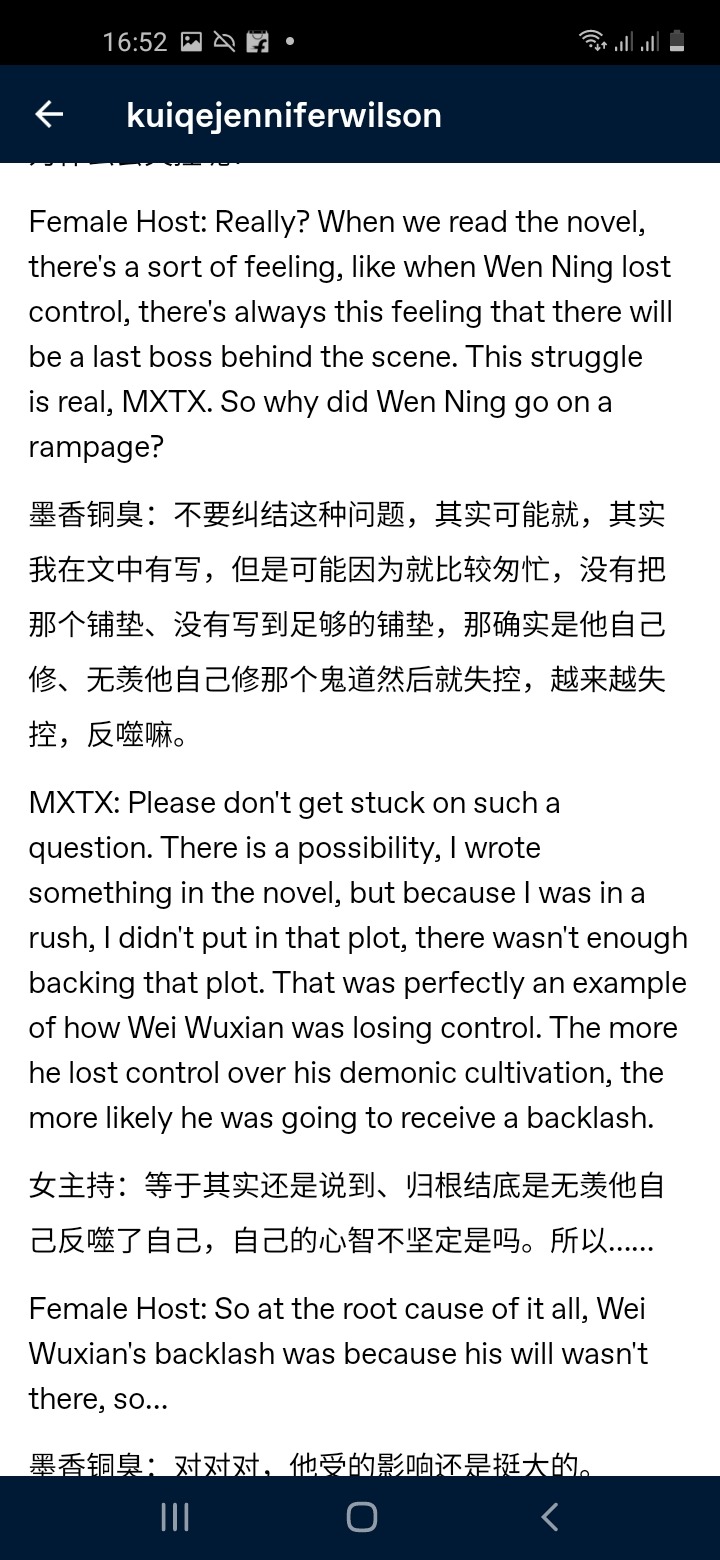
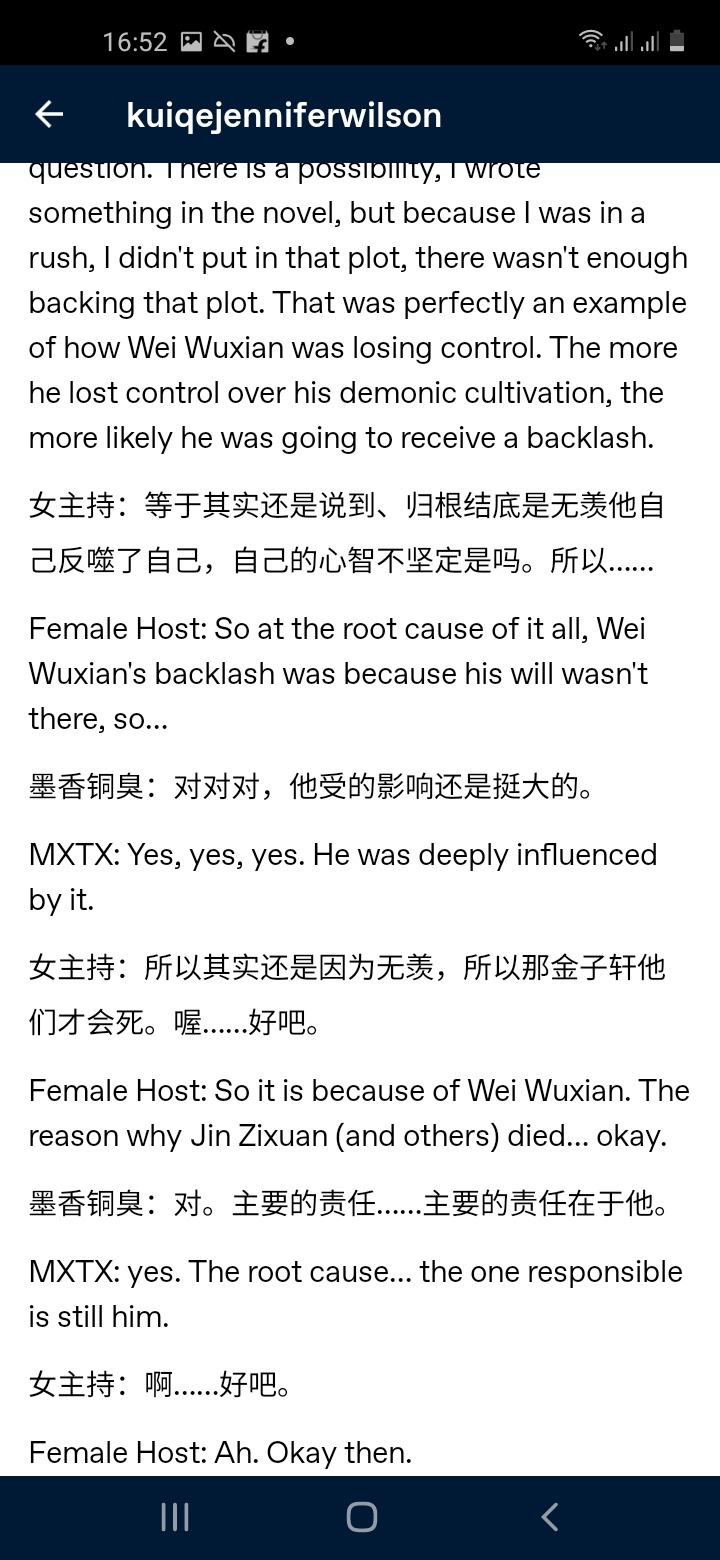
Thank you, it really makes me happy when people say they like my metas 🥰
So, I'm assuming this question is in relation to the interpretation that JZX's death and WWX's loss of control can be attributed to his mental state (and not guidao), and therefore (along with JZX actually being the one to attack first) WWX can't be considered entirely responsible for it. This is not exactly an opinion that I have—I do not believe WWX's cultivation is completely harmless.
To discuss this I think it would be helpful to first look at another translation by Gggg_Zhan of this interview excerpt, and also consider the context of MXTX's answer.

When MXTX says he in the one responsible for the death of JZX, it is specifically in relation to the interviewer asking if there was someone else behind it (such as CQL's second flautist), so when she says he is responsible, I do not think she is denying that there are mitigating factors (mental state/guidao, self defense), she is just specifically saying that that was no other person involved.
As well as that, it is pretty clear from Zhan's translation of this interview that MXTX outright said WWX's mental state did play a role in his loss of control, as well as his long-term use of guidao.
And actually, even back during the SSC, WWX was aware his cultivation was having some effect on him, this was in fact why he decided to forge the yin hufu.
'When Wei Wuxian first forged it, he didn’t deliberate too much over it. As he had to use his very own life essence [6] to control zombies and evil spirits, there were times where he was bound to feel tired.' (ch.30, tmwx)
Tangent about 'life essence' — the footnote tmwx gave for this is: '[6] 元神 (yuán shén) – Can be translated as “life essence” or “primordial spirit”. In Taoism, it is defined as a level of existence that can be cultivated, surpassing that of physical existence, capable of existing independently in the form of a soul.'
Back when I first read this, I was curious about how WWX's cultivation worked and what exactly this meant in the context of MDZS, so I searched for instances of 元神 in the chinese version. In many instances it was translated to soul (for example MXY's 元神 was destroyed in the ritual), in ch.64 it is mentioned that the songs in the collection of turmoil will disturb one's 元神.
他心中高興,拍的這一下險些震倒了書案上的紙燈,藍忘機眼疾手快地將它扶了起來。魏無羨道:「藍宗主,這本《亂魄抄》裡面,有沒有一支曲子,能擾人心神、使人元神激蕩、氣血翻騰、暴躁易怒之類的?」
exr's translation: Wei WuXian spoke, “Sect Leader Lan, within the The Collection of Turmoil, is there any that can disturb a person’s composure, making them irritated, agitated, violent, easily-angered?”
7S translation: Sect Leader Lan, is there a song in the Collection of Spirit Turmoil that can disturb someone's mind, agitate their primordial spirit, unsettle their vital energy, and make them easily prone to anger?
So I think when it says WWX's use of his life essence/soul/元神 to control corpses made him tired, it is maybe not as simple as just feeling tired, but rather more of a spiritual or mental fatigue.
Additionally, in the original draft of MDZS, WWX told LWJ and JC in the supervisory office that he uses his 元神 to control corpses, this seems to confirm to LWJ that WWX's cultivation is harmful and prompts him to inquire a few times specifically about his temperament which was also removed in the edits.
It's also clear from the Nightless city battle that WWX's control over his corpses is tied to his control over his emotions
The more Wei WuXian panicked, the less control he had. [...] He took up Chenqing, placed it by his lips, and began to play. He only managed to steady his mind with great effort. This time, the corpses finally stopped ignoring his commands.
In chapter 7 we are told WWX's cultivation is harmful: 'Wei Wuxian’s method of cultivation might have been denounced by the rest of the cultivation world, and would also affect the practitioner’s constitution in the long run. However, one could achieve results quickly, as this form of cultivation was not restricted by spiritual powers or innate talent.' (tmwx)
When looking at all of these things together, we can make some assumptions about exactly why WWX's cultivation is harmful.
As we know, WWX can only use corpses that are already resentful. In order to control them he must control their resentment, stir it up, direct, and calm it as he requires. Since WWX's control of them is tied to his control over his own emotions, it would require constant mental and emotional effort — this is part of the reason why not just anyone can control corpses like WWX does, WWX is extremely skilled at rationalising, suppressing or letting go of his feelings, so I believe he applies that to his cultivation too.
However, 'though Wei Wuxian thought that his heart was like a stone, in the end, he was still human, not some emotionless grass or plant.'
What human could keep up such strenuous control over themselves forever? Who could take on the resentful energy of others and manage it every day without it wearing down on their mental state? We see WWX become more short-tempered, sometimes cold, sometimes angry after he starts using guidao, until it culminates in him losing losing control entirely. I think WWX's mental state and WWX's cultivation are far too intertwined to draw any sort of line between them, the two are compounding.
So it seems WWX's cultivation can harm his mind. I think we should also consider if resentful energy can harm him more directly. There is canonical evidence it can, such as how the strong resentment of NMJ's arm caused all the (high-level) Lan cultivators to qi deviate to the point of passing out. WWX seems wholly unaffected by it, probably he is more than used to it, after being around such energy day after day for many years of his life. But is he immune to it? Probably not.
Now onto the morality of this — is WWX's cultivation wrong because it can be harmful? No. I find this idea very silly. Should sports, such as figure skating, be considered morally wrong because of risk of harm? Obviously not. As well as that, regular cultivation in MDZS carries a risk of harm too — cultivators can die from qi deviation, its not even considered that unusual.
So, could WWX's cultivation be considered wrong because there is a risk of losing control, and therefore harming others? Also no... but within reason.
WWX had never lost control over his cultivation before, so I don't think it is fair to say he should have seen it coming or consider his loss of control a moral failing on his part. It was an accident that he couldn't have predicted. Post-canon, he's in a very different position to his first life, he no longer needs to use guidao constantly every day (remember that it is only over the long-term that it can be harmful). Mentally & emotionally he is in a much better state and is definitely not at risk of losing control over himself as he had before. Plus, now that he has LWJ by his side, he will definitely always be okay no matter what.
#mdzs#mdzs meta#many tangents here but i hope it answered your question anyway#wei wuxian#like.. we can think of guidao as a tool or weapon that can be wielded properly or improperly for good or bad. the same as any other#if someone is not very skilled & frequently loses control & puts people at risk then yeah i'd say that's condemnable#but that's not what is happening with wwx...
134 notes
·
View notes
Text
tl;dr For 'Fic Followers:
In the upcoming weeks / months, I'm going to be posting for maybe 3 to 4 fandoms at a time.
If you are subscribed to me on AO3 and would like to avoid emails for fandoms you don't care about, I have a post HERE that tells you exactly which series you can follow to get all the updates for the fandom of your choice :)
===
Updates
I recently discovered you're allowed to put essays/meta on AO3, so I think I'm going to copy the five big species overviews from @riddledeep over to an AO3 document sometime soon.
iirc, they're like 20k words apiece, which isn't allowed with the current Tumblr editor, and I've had those posts flagged a couple times for having my body reference images in them (even though they're blobby bodies that don't depict anything), so I do get nervous about losing them and in the past, I wasn't able to edit without them getting flagged, so it would be nice to have a back-up place for them in case they ever get shut down.
I'll probably make another piece for "7 Billion Years in 15,000 words" just because I feel that also qualifies as essay form and it's a piece I really like, and I could probably add Fae Magic as an essay as well.
I think everything else will stay on the sideblog - The sideblog is mostly character profiles, family trees, maps, and the episode timeline and would not qualify as AO3 legality in my mind - but I think these things would be okay and now you know 👍
These posts will still be on the sideblog, just copied
Right now I'm wrapping up One and a Half Birds- 12 of 15 chapters up, draft complete and they post every Friday. My plan is to post the last 2 chapters of Criminal Experience on Fridays after this (They're fully outlined but not finished yet) since Friday was always its update day.
After that, I think I'll post these FOP essays as a cue to my AO3 followers that Friday is being phased out as an MCYT 'fic day in favor of FOP stuff (with Sunday as the new secondary MCYT 'fic day).
For years, I've balanced on that razor edge of knowing my writing has improved a lot lately and that I'd love to tidy up Origin and Knots so they present the lore better and fit my current writing style (which I think is cleaner), but that's a dangerous road to go down, so I've kept moving forward instead.
That's also why I've tried not to get sucked back into the sideblog, as I just really want to wrap Origin and Knots up. Bit of a wake-up call for me when I realized I think when Dog's Life goes on hiatus in a few weeks, it will have outpaced the wordcount of Knots which I started in 2017, wheeze...
I look at Origin and Knots and see them as things we're only 3/5 or halfway done with and it's scary to me considering how much very important stuff I'm balancing (i.e. upcoming Anti-Cosmo and Anti-Wanda relationship pay-off after a very long slow burn; I wrote their first romantic scenes back in 2016) and I hope I do a good job conveying everything right.
Definitely have to grit my teeth and remind myself that "done is better than perfect," though, as I just am never satisfied with it- I had to scrap a lot of things I was excited for because of new story directions, but I think I've pulled everything back together, and I'll be excited to share what I have coming up.
tl;dr - I do love this lore, and as far as I can tell, these long posts would qualify as meta essays and be legal, and that definitely makes me feel safer considering how many times my 20k-word Anti-Fairy culture post got flagged despite the bodies being blue and green, wheeze...
And I've always wanted to write an essay about Lexiconian vs. Hexagonian culture, so I might do that as well, and I'm almost done with my 60k+-word piece about the lore in my MCYT 'fics, so I'm very excited to share :)
Lastly, while this is not lore or an essay, I'd like to copy some or all of my Total Drama 'fics from FFN to AO3, as I discussed in the beginning of the year. I'm thinking I might start moving them in June for Life of a Loser's 11th anniversary.
This 'fic had shorter chapters than what I have now and will probably be updated every few days (Maybe a Mon-Wed-Fri schedule?), which can lead to many emails. So, if you want to limit emails, check THIS post to find out which series to follow for the content you want :)
Closing Note - I have maybe 2 'fics that already have "Here are the series you can follow if you only want updates for this fandom's content" notes in the end notes.
I think I'm going to do a big sweep of all my stuff and make consistent end notes for all pieces. We shall see!
Anyway, thank you!
#Fairly OddParents#FOP#FAIRIES!#ridwriting#?? not going to tag the other fandoms#Btw heads up - I'll probably reblog this post again Saturday or Sunday so people see it
6 notes
·
View notes
Text
i'm thinking of moving a bunch of stuff i have on discord over to tumblr + polishing it; feel free to say in the replies if you're interested in this generally/what you're interested in seeing in specific?
dsmp meta
- c!dream, c!tubbo, and c!tommy (short)
- c!dream and the lie of "i had to" (long)
- c!tubbo, c!tommy, the green festival, and narrative foils (short)
- my thoughts on c!dream being villainized by c!wilbur (long)
- s2 c!tubbo and c!tommy neurodivergent reading (idk how long this one will be)
- what if i just dumped a bullet point list i made in february 2022 about why lore discourse is so bad in this fandom? like half of it no longer applies but i still find it interesting
fic rec lists
- mdzs
- tma
- dsmp
also if you want me to write a dsmp meta on something that u know i have Many Thoughts about but you dont see it here u can do a write-in request but i might not do it. cool cool thanks everyone for your time. i'm also percolating a non-fandom Frustration Post abt psychiatry but that'll happen when it happens--i did a draft that i knew was wrong, figured out a couple days later what was wrong about it, now i've got to figure out what to say that's right. oh, if people want life updates, that's another thing you can request, i've had a kind of crazy past few months; i mostly talk abt it on discord but i could put stuff here also if there's interest
13 notes
·
View notes
Text
January Postmortem
(I know this is a Goncharov blog now, but i ought to wrap up my IFComp entry, I guess. Here are some of my thoughts on the game.)

THE SHORT VERSION
I’m not very good at saying things directly; I prefer to dress them up in stories and let people make of the anecdotes what they will. So we’ll open this postmortem with one such story.
Once upon a time, many bad things happened to me. When I was telling my friend about one of them, she said, “I’m sorry that happened to you.” And me being me, I replied, “Do you mind using a different phrase? Maybe, I’m sorry you had to deal with that or I’m sorry you went through that or wow that sucks – any of those would be fine.”
I’m aware that I’m not the hero of anyone’s story. But even if I’m not the hero, at least let me be the protagonist of my life. Let me deal with things; let me endure things; let me go through them. Don’t let them happen to me as if I’m already stretched out decaying in the ground.
And that’s pretty much all there is to the game. Could’ve saved myself a lot of hours by writing that instead! So thanks for reading, and as a special reward, here’s my playlist for January. Once again, me being me, it’s a playlist of poetry, not music. 😊 Enjoy!
THE LONG VERSION
Before we get into the meat of it, a clarification: I’ll use January to refer to the work as a whole (which I will also call a story, a game, a thing, whatever) and January to refer to the protagonist.
Also warnings for spoilers and for very frank discussions of suicide, gore, bodily functions, vulgar language, etc.
So January’s story has been kicking around in my head for some time, maybe 3-5 years, but I couldn't find a good reason to share it with other people. It was just another apocalyptic story about some sad guy, a genre woefully oversaturated and out of vogue even five years ago. Some of the scenes survived from early drafts nearly verbatim (including the opening line, which has never changed), but most did not. For example, in the canonical version of the story (yes, my personal canon is different from my published canon), January finds a dog as well, who is a perfect delight. But Dog’s arrival botched the pacing of the story and sweetened the scenes too much, so she had to be cut.
Anyway, while I was nudging the idea of January’s story around in my mind, two things happened. First, I was working on a research project about how people cope with major life shifts, especially illness, via storytelling and the re-imagination of self through narrative [see: The Wounded Storyteller by Arthur Frank]. And second, the many aforementioned bad things happened to me. Between my own experiences and the narrative theories I was studying, I felt that I could do something meaningful with January’s story. I wanted to use interactive fiction to show the linkage between moments across time and between the internal and external self, in ways that linear prose can't.
As a result, I think of the story as functioning on three-ish levels.
Level One
First, there is the literal plot. As many reviewers noted, this is the least important of the three. Guy survives apocalypse; his brother and sister-in-law get infected; he feels mortally responsible for their deaths, but can’t quite bring himself to commit suicide; he spends the next year working through the guilt and grief; he adopts Cat along the way; eventually he returns to the other survivors and resolves to stay alive for now.
Happy to answer specific questions about the plot, if folks are curious! But I won’t bog us down with details here.
Level Two
Second, there is the meta plot. As mentioned above, January is a story about storytelling, or more precisely, it is a story about how autobiographical storytelling assists in reforming the concept of self after a major life rupture. Hence the epigraph of the game:
One of story's primary purposes is to lay claim to experience. Autobiographical storytelling can take personal experience back from silence, shame, fear, or oblivion. It says, "I cherish this" or "This haunts me."
It asserts the significance of events in one's life: "This happened to me." "I did this." "This is part of who I am." "This should not or will not disappear, and I act to preserve it by turning it to words and shaping them as story."
Initially this concept was going to be more, let’s say, heavy-handed. More explicit, with four+ versions of each scene involving revisions, removals, and additions of commentary from January as he gradually shook off the coma of grief and refashioned the telling of each scene to better suit his new sense of self.
For various reasons: no. This plan was not only logistically unsound, but also narratively questionable because January did not want to speak for most of the story; he certainly did not want to add cutesy notes to the detritus of his life. So I aimed to unfold the concept in a more natural way, with descriptions progressing from abstracted, painfully detailed and impersonal landscapes, to a more natural flow of action and commentary, to casual cussing and chattiness with the cat, and finally to first-person POV.
Not that it is an entirely linear progression. The narrative—the narrator—the author—all of us argue constantly and intertextually with each other about what should be kept in the story, about what “should not or will not disappear.” Indeed, there were many times that I continued to work on the game only because I promised myself that I'd delete it all when I was done, once I had properly excised this from myself.
I finally managed to counter that argument with, “Well, but what if someone else benefits from it?” I find comfort in consuming media about suicide when I feel that way, and there’s a separate essay here about normalizing and validating mental health struggles, but let’s table that one for now. But knowing how I appreciate that kind of media myself, it seemed petty, if not outright unkind, to refuse to share January.
That particular arguments comes through, for example, in the post-POV-shift train scene. January relates how he peeled the dying woman off the frozen train and wrapped her in a tarp "just in case" she changes her mind, as he did. The woman is, by all accounts, a half-corpse already and actively being devoured by an omen of death, but until you are sitting there feeling yourself die, you don’t know, I promise you, you don’t know whether you will change your mind. And far be it from him to decide for her—so here is the tarp, here is the story. Do with it what you will.
This concept also crystallizes in the final pre-POV-shift scene and the POV shift itself. As January falls ill with fever, he has a nightmarish remembrance from his childhood, opening with, “In the story he told himself about his life, death found him one night…” It’s one of the more inelegant phrases in the game, in the story he told himself about his life, but it’s exactly how it needed to be said. Every scene that has been presented to the reader is part of the story that January tells himself about his life. What you read was not his life. It was not even a factual attempt to recount his life; it is only the version(s) of the story that he chooses to tell himself.
This is critical, both to the reader and to January, and he tries to stress to us the fictionality of his account, many times, in many ways. He says that he cannot have slept for multiple days after the fever and the dream of drinking from the bowl of stars with Cat; he cannot have survived his initial suicide attempt in the parking lot; he should not have heard gunshots by the sisters’ house without glimpsing his pursuer or attracting zombies; he should have smelled the hanged man rotting; he should have noticed the presence of the little girl in the dogtrot house sooner, or she should’ve already been dead. And of course, he should have killed himself after they died. (And probably a cat shouldn’t be able to speak to him or understand him.)
Guilt and grief contribute to the instability of his account, but they don’t fully explain it. I do not want to pitch this as an unreliable narrator whose memories are wracked by trauma—quite the opposite. Rather than treating memories as sacred truths that should (or even could) be accurate, memories in January are tools of self-examination, things to be laid out and sifted through in an effort to process trauma. If the memories need to be reworked, details fudged, inconsistencies introduced, in order to make them fit better into his new self, all the better. There’s no one left alive to tell him that he’s remembering things wrong anyway.
(Sidenote: as someone who tends toward SDAM, I have a pretty irreverent view of memories. And I know that the memories I do have are factually inaccurate. I know this because I transitioned genders in adulthood, and yet all my childhood memories have been revised to fit my real gender, not the one I mistakenly happened to be as a child. In my memories, people always call me by the right name, even though that name didn’t exist twenty years ago.)
I want to highlight one more example of revisionary self-history in January that does not involve the POV shift. In the second scene of the game, in which January explores the dogtrot house, he describes the pain of his bruised ankle thus: “He breathed through the red. He imagined the bruise oozing through his sock like an open wound, dyeing the wool a deep, mashed, mulberry purple.”
Many months later, after January mercy-kills the hanged man, he describes the scene thus: “Red spilled from its neck. Pure blood red, not bilious or spoilt-black. From the collar of his shirt up to his chin, the man's neck was mashed mulberry with deep bruises, and these must have continued into his face, but he could not see the face now and did not want to remember.”
To the reader, chronologically the ankle description comes first. But this is a narrative illusion. Everything in the game has already happened by the time the first scene loads. Thus, when we read the earliest scenes, we have to view them through the lens of the later ones—that is, January himself views his earlier memories through the lens of later events, as all humans do. To be specific, when January tries to think of how to describe his bruised ankle, his mind twitches back to the morbid sight of the hanged man’s throat (that he “did not want to remember” but that insists on being remembered anyway), and he uses that real event as a blueprint to imagine how his pain might appear.
A couple reviewers asked why anyone would bother to read the scenes out of order. I think this is the heart of the answer—because in January’s mind, the scenes do not proceed in order of chronology, they proceed in order of random association, just as you might remember a pair of birthday parties from when you were twenty and when you were twelve. The memories/scenes float together in a pool of associations. They gossip and converse with each other, stealing descriptions, reusing phrases, imprinting later images on earlier events, and referencing later events that the reader hasn’t experienced yet, although January has. Accessing them out of order opens the door to serendipitous connections between descriptions and better reflects the sensation of remembrance, I think—but as we’ve covered, I have a pretty weird memory system, so take that with a grain of salt.
I swear we are almost done with this section. LAST THING, I do want to address the POV shift directly. There is something very me about writing a story obsessed with agency while refusing to give the reader any. Sorry! But this goes back to the fact that January is telling himself this story. He is not telling it to you, you are not a character or an actor here, and so your agency is largely non-existent and unimportant. What matters is January waking up, re-becoming the protagonist of his own story, and eventually claiming ownership of it via the POV shift. I think this is the most obvious part of the game to grasp, so I won’t dwell on it any longer. 😊
Or will I. (Yes, I wrote this section at 1:45am, how can you tell.)
Level Three
So we have the basic plot, we have the meta plot, and now we have… let’s call it, the personal plot, as the third layer of this shitcake. We are now stepping completely outside the narrative/the narrator and into my little brain.
Earlier I mentioned that I was researching how people use stories to cope, especially in the context of illness. Let us use “illness” very broadly to mean “disruptive health event,” anything from a severe injury to the development of a disability to a cancer diagnosis to mental health issues to chronic pain conditions to et cetera. In short, something that fucks you up.
Let us now imagine that many of the bad things that happened to me can be counted as “illness” and that they did fuck me up. Finally, let us allow the author to project their own grief and recovery process onto the two previous levels of plot. Et voila, we have a personal disability plot hiding in the game the whole time.
I don’t want to say too much about this, because one, it is quite personal, two, I don’t want it to affect other people’s readings of January–I don’t want to impose this as the “right” reading, and three, there’s so much overlap between this and the previous section that not much more needs to be said. We are still dealing with a life disruption, a loss of sense of self, an adriftness, a feeling of one’s life traveling on without you, of things Happening to You, a painful self-examination and reconstruction of a new self, and finally an ascent to some kind of agency.
The one thing I do want to highlight in terms of an illness/disability reading is the motif of eating that runs throughout January. Healthy folks may not immediately connect eating to illness, but boy howdy, are they intertwined. Eating is a nightmare for almost any kind of severe health condition. For example: you get the nausea and vomiting from chemo, you get the constipation from pain meds, you get your body trying to self-destruct via diabetes or celiac if you eat this or don’t eat it or eat too much or too little, you get a ravenous appetite from the mood swings, you get your appetite killed by stimulants, you are spitting up acid, you are shitting liquid, your fork won’t stop shaking, and you can’t get the food to your mouth. And so on.
Eating is such a fascinating, multi-valent concept in fiction. In this game alone, it encompasses the zombies’ unrelenting, deranged voraciousness and the tender little sight of January choking down kibble so that Cat feels safe enough to eat with him and the anxious morbidity of January insisting that Cat eat him after he dies. Which is to say, there are so many ways to read the concept of eating, but I’ll limit myself to commenting on it from this angle.
The first several scenes frame food within frustration: it is a necessity (January forces down the kibble in the dogtrot house, thinking of it strictly as “sustenance”), it is a repulsion (the charred meat in the train scene, mostly likely human flesh; the guilty dwelling on meat after the bird dream), and it is a thing-to-be-earned (the mangy cat doesn’t deserve kibble, January remarks, but we get the sense that maybe January doesn’t feel like he deserves it either). Ultimately, food and eating are symptoms of being alive, and that is anathema to January in the early game. Each meal forces him to recognize how hard he is working to stay alive despite the feeling that he ought to be dead. It’s a slap in the face.
In the mid-game, eating/surviving becomes something more rote, still unpleasant but not as guilt-wrought. January eats alongside Cat because that’s what they do. After Cat tries to feed him an oriole when he’s constipated and skipping meals, January later tries to return the favor by luring in a whole flock of birds for sick Cat to hunt. (Is it notable that both of their avian attempts to feed each other are failures?)
Of course eating/surviving/being alive also runs the risk of being dead, as highlighted by the scene where Cat seems on the cusp of death after eating some plant he shouldn’t have. While pleading with Cat, January asks what he’s supposed to do with all the food he scavenged for Cat—what is he supposed to do with all this effort at being alive, if it just comes to this again?
And the thing is, it will always come to this. All the living in the world will always come to death. This is the heart of January’s own near-death scene, in the next month, when he sees a gray sky full of ghosts and declares “there was no hope in it.” There’s no particular sunburst of revelation after the fever dream, just a realization that he’s still hungry and still alive and that Cat will sit and wait until January’s ready to eat with him.
(Ah, the bowl of stars that he drinks from. That image/phrase is a direct rip from a very famous horror novel, and if anyone can name it, one free cat cuddle to you! [Must supply your own cat.])
I could pick at more details, but you get the gist here. A last note on illness/disability: I didn’t really get into the horror genre until I was unwell, and then I used horror movies both to escape from pain and to realize the pain, to watch someone else suffer and nod from my seat and say, That’s it! That’s it, that’s what’s inside me. You all can see it too, now. Apocalyptic settings are a bit different, but related—it’s not so much about the pain and fear made manifest as the loss. Becoming disabled is very much a private apocalypse. Swaths of society are lost to you. You cannot go there; you cannot participate in the thing; you cannot create what you used to. Please don’t take this as an invitation to debate inclusivity measures—just believe me for a second when I say some doors are closed, and there is nothing you can do but accept it and find a new door to open.
January doesn’t spend very much time lamenting what’s been lost, not in tangible terms like missing pizza or electricity. In fact, he regularly refuses to engage with the remaining shreds of civilization. He’s not comfortable staying inside the apartment of the woman with the painted nails, nor entering the cottage in the garden, and though he makes some allusions to camping in houses from time to time, this is never shown on screen. He only tells us about sleeping outside in his tent. So, we might say that he copes with the apocalyptic loss of society by rejecting any desire to reconstruct it. Instead he forms his own routines, as many disabled people do.
A favorite scene for many reviewers was a short one in which January gives new names to the flowers he doesn’t recognize. Loss perfuses this scene, but so does freedom—the realization that you can shed what was lost and reconfigure what still exists. The flower scene presents a tidy bow, I think, on top of the messy package that is illness, grief, trauma, and autobiographical reality rewritten.
Thanks
Finally, some thanks. Thanks to Sjoerd for teaching me how to use TweeGo, huge huge thanks to Eli (@addictivities) for working with me on producing the art for the game, thanks to @agnesmontague for getting me started thinking about this postmortem, thanks to all who read January, and thanks to those who attempted to read it and said “absolutely fucking not” for their own well-being.
I’m still completely gobsmacked about placing in the top ten, and I really appreciate all the feedback that folks have given me, both publicly and privately. Take care of yourselves, everybody, and if you ever want to talk through stuff, feel free to reach out. <3
34 notes
·
View notes
Text
in reply to @miithriin to this tasty meta (x) Go there and read that!
(hope that other adar post mentioned in the tags comes back to memory ;) )
(For some reason tumblr won´t let me reblog, for other posts the reblog opens fine, but this one doesn´t, did all the clearing cachee, pausing browser extensions etc. and it doesn´t work)
The part about “Why is Rowan the victim in the scenario and not Waldreg“ is super interesting, especially the bit about how Waldreg “had angered Adar by calling him Sauron” giving this moment two aspects one of the alliance and “binding” and one of punishment/redemption for this transgression!
And I really hadn´t thought about how Waldreg´s torc/torque factors into his status in that society and into how he would be perceived regarding that!! That´s such a good point.
The remark about Bronwyn putting that orc head on that table gives me food for thought too, for me it seemed just like the logical place for that demonstration because the tavern is where plenty people would be gathered, (and with Waldreg having pushed back against her warnings the loudest it makes sense to have him be the one to get the head under his nose) but indeed Waldreg being in charge there is a good point in terms of authority.
The question of “worth” / “being of use” also really made my brainworms wiggle again:
A child would probably be most valuable if you want to form them, manipulate and shape them into your cause or society, but someone older like Waldreg, experienced and competent might have more to contribute.
And in that situation a child might run off or refuse, ok anyone might, the murder request sure could have been pushing too far and I´m kinda wondering what would have happened if Waldreg had refused.
But just in general:
Do any of the Southlanders have worth to Adar?
Does Adar “need” any of them?
Was he hoping to increase his ranks when he made that offer?
Or was that offer solely made because it would mean that there are less people they have to fight against and that might save uruk lives?
regarding @niennawept´s reply: yes! I just typed in for another meta post draft how forcing such a deed onto a prospect or applicant is a long and well tried technique of gangs, cults, sororities, fraternities etc., The “human sacrifice version of a sunk cost fallacy.” (love that description!!) is real!
And having aspiring members commit some kind of bad thing not only binds to the new group within that group, it at the same time also very much separates from the rest of society, because they have to fear retribution, being ostracized or at the very very least being side eyed for what they did. At worst it means they really have nowhere to go but the new group.
12 notes
·
View notes
Note
Unusual writer asks: BTS on the Hexley Saga!
[ellie-e-marcovitz ☺️]
Thanks for asking! 💛 Choosing just one scene from the entirety of THS is impossible, so I’m going with the prologue AND the epilogue for the sake of completeness! (They go hand in hand anyway…)
Unusual Writers Asks are Here!
Prologue - November, 1981
It started with the fireworks.
And so it begins, 5 words down, 500,000 to go. Though these are the first words of the Saga, they weren’t the first that were written; the prologue was actually the last chapter I wrote for Mystery at Hogwarts! In fact, I didn’t write this chapter until I’d written the first drafts for the first four instalments of the Saga and gone back and rewritten the whole of MaH (literally, scrapped most of it because it was rubbish and started over). Once I had done that, I felt like I needed a framing device, and so this scene was added.
“Where are you going?”
A small voice called out through the darkness. Jacob turned around, and saw the outline of a small girl sitting on the windowsill, her face illuminated by the flashes that still came from the sky outside.
Here is our first glimpse of our protagonist. This was another reason I wanted a Jacob perspective prologue, as well as setting the scene, it meant that Artemis was introduced in the story through the eyes of someone else. Having Artemis visually described for the first time in another character’s deep 3rd person narration seemed much more organic than having her describe herself that way, especially as she is a character that doesn’t take much interest in her own appearance.
Since the day she had been born the two of them had been so close that they could tell what the other was thinking.
Oop, foreshadowing.
“Will there be a Niffler in the story, or a dragon?”
More foreshadowing, this time it gets meta.
“Please don’t cry, Missy, you’re making this harder than it already is,” said Jacob, and he walked out of the house before his sister could start to cry or scream. He couldn’t change his mind now.
The front door clicked shut behind him, and he walked down the pale grey steps to the pavement outside the house. Turning back, he saw that Artemis’ little damp face was pressed against the windowpane, her breath fogging up the glass. Jacob pressed his fingers to his lips, and raised his hand to her, before he turned away and walked down Lovelace Crescent, past the terraced houses, and paused at the corner of the road.
Not so much foreshadowing as backshadowing - these are the same words Jacob says to Artemis after she finds and loses him again in PotV. Her reaction this time is different, though, showing how much she has developed in the time he was missing. The path Jacob takes through Hexley family’s house is also echoed in PotV, as Artemis takes the exact same route and pauses at the exact same places as she prepares to leave to spend the summer with the Weasleys, symbolising how she is now following in Jacob’s footsteps. She even apparates away from the same place, though she does so via side-along apparation with Bill. Again, this is deliberate, showing how Bill has started to take Jacob’s role in Artemis’ life, though whereas Jacob left Artemis behind, Bill is taking her with him.
Epilogue - December, 1999
Below the cut, bc spoilers, obv.
It was almost midnight.
As soon as I wrote the prologue, I knew exactly what I wanted for my epilogue - the whole Saga bookended by two scenes that each reflected the other. The countdown to the millennium seemed like an ideal time; 18 years after the prologue so long enough for someone to grow from an infant to an adult in the time in between, and at the end of an era with the promise of a new start. And fireworks. Artemis loves fireworks.
“Did you find your rowan tree alright?”
“Yeah.”
“How was it?”
“Peaceful.”
Rowan’s birthday in my canon was placed on NYE because of this epilogue, so that she would be remembered right until the very end. I can’t remember when I decided on Artemis’ tradition of visiting the tree at sundown each year (it might have been at the same time as deciding on Rowan’s birthday, it might have come later), but the idea of her returning to a tree annually just to be with Rowan for a little while was inspired by the bench in the botanic garden on midsummer’s day in The Amber Spyglass by Philip Pullman (from whom I expect to receive a lawsuit any day now).
Artemis swallowed hard as she turned away from the boy who looked like Tonks and saw George Weasley setting up the fireworks by himself.
Canon compliance is tough. This hurt me.
Someone asked for the time, and Artemis’ eyes immediately went to her ankle, despite her having not worn a watch on it for years.
I couldn’t not reference the watch. Artemis has come so far and has cut ties with her family by this point, but still her heart pulls towards the history she once had.
Artemis felt a soft pressure on her right cheek, and turned to see Charlie at her side, a small smile playing on his freckled face.
“Happy New Year,” he said quietly, his eyes fixed on the darkened horizon, where more fireworks had started to appear in the distance, some sooner, some later, as other groups of wizards, witches, and Muggles waved goodbye to the previous century and ushered in the new one.
Again, I couldn’t not put this small detail in. I think the majority of my readers have at some point asked me if/when these two will ever get together, and so this little kiss on the cheek is for the Charlie/Artemis shippers. It’s friendly, but if you wanted it to hint at something more, you can read more into it (I know lots of people did). Avid fans of His Dark Materials will pick up on the fact that pattern of the prose in the second paragraph mimics that of the ending of the Amber Spyglass, which is a final nod to the the story that has inspired my writing and my soul more than any other (aside from HP, which is a given).
All alone now, Artemis watched the fireworks and listened to the crackles and whizzes and bangs that were the only noises echoing through the January night. The grass at her feet was damp, the air around her was cold and laced with the scents of pine trees and gunpowder, and her lips still tasted faintly of sloe gin. Her fingers tingled, and her toes were numb, and her pulse coursed through her veins as her heart continued to beat in her chest, reminding her how very alive she was in this moment. Not that she needed the reminder. Right now, standing on Stoatshead Hill at the start of a new year, a new century, a new millennium, she felt more alive and more free than ever.
I didn’t want an “all was well” ending for Artemis. I’m all for nuclear families with 2.5 children born nicely in wedlock with the person you fell in love with as a teen, but that’s not the ending my wild child wanted or deserved. She deserved this: to have her found family around her and have the strength and confidence in them to tell them that she is happy for them to leave her for a little while, in contrast to the prologue in which she begged Jacob to stay. She deserves this moment to just be herself, without the expectations of anyone else around her - and she gets that. The pine, the marzipan/sloe gin, and the gunpowder are all the scents that one would smell in Amortentia if they loved Artemis. She is surrounded only by the very essence of herself in this moment. Everything from “the grass” in this paragraph to “the end” a few later came to me on a run and I stopped to write it all down because I couldn’t bear to forget even a word of it.
And as the last firework disappeared into the night sky, so did Artemis Hexley.
It started with the fireworks, it ended with them, too.
8 notes
·
View notes